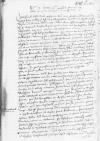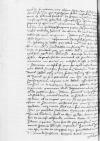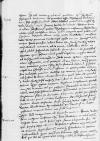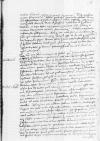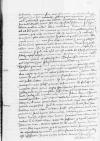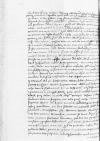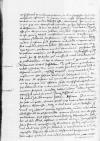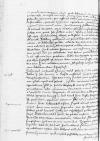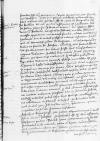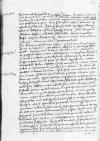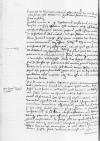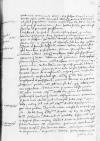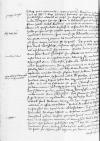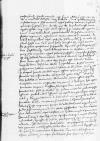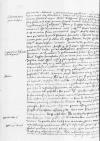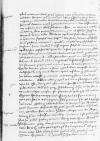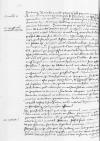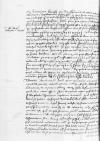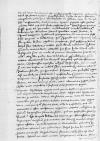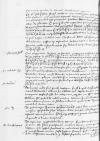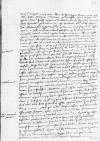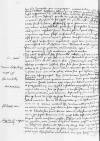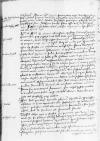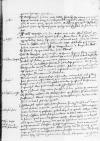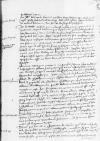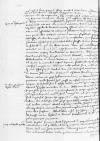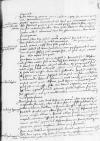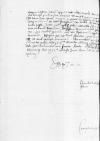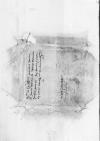Optatissimas ⌊⌋, postquam diu per ⌊Brabantiam⌋ ⌊Hannoniam⌋que vagatae fuere, tandem sub finem Quadragesimae[1] ⌊Londini⌋ in ⌊Anglia⌋ recepi.[2] Causam autem diutinae illius morae nullam aliam esse compertum habeo, quam quod ⌊Lazarus Tucher⌋, ad quem perlatae fuere, me in ⌊Angliam⌋ rediisse ignorabat, atque amici, quos in aula[3] reliqueram, reditum inde meum in singulos quasi dies praestolarentur orig. prestolarentur⌈praestolarenturpraestolarentur orig. prestolarentur⌉, qui tamen eorum exspectatione tardior fuit. Utcumque sit, pervenere ⌊⌋ ad me integrae sanaeque, quod in ea temporum iniuria obsidentibus mare ⌊Gallorum⌋ ⌊Anglorum⌋que classibus[4] miraculi loco haberi debet. Quodque magis mirere, pertulit ⌊⌋ ad me ⌊veredarius Anglicae gentis⌋, homo, qui, si compertum habuisset, quod illae continent de ⌊sua gente⌋ ⌊rege⌋que, sane haud umquam orig. unquam⌈umquamumquam orig. unquam⌉ exhibuisset. At bene cecidit sublevatusque sum ingenti orig. ingente⌈ingentiingenti orig. ingente⌉ metu, quem tarditas illa mihi incusserat, aliquid scilicet humanitus tibi obtigisse. Principio itaque ingentes tibi gratias habeo, quod ⌊⌋ interpretatus sis written over m⌈mss written over m⌉ in optimam partem et non exueris paternum tuum erga me affectum. In quo uti perseverare perdurareque velis, etiam atque etiam peto et filiali quodam iure, quod reciprocum est, postulo.
Facies written over m⌈mss written over m⌉ temporum talis fuit, qualem eam depinxi, atque utinam non et haec tempora novam nobis invehant, ita sese disponere praeparareque orig. preparareque⌈praepararequepraeparareque orig. preparareque⌉ videntur. Sed quid facias? Ferenda nobis sunt omnia. ⌊Auraicae⌋ princeps ⌊Renatus⌋,[5] ⌊Godtschalcus⌋,[6] ⌊Zegherscappele⌋[7] ceterique orig. caeterique⌈ceteriqueceterique orig. caeterique⌉ honesta de se relicta memoria fecere viam nobis secuturis orig. sequuturis⌈secuturissecuturis orig. sequuturis⌉. ⌊⌋, quo die ⌊Bruxellam⌋ ex ⌊Anglia⌋ reversus sum, eo et ipsum reversum inveni magna mea ⌊eiusque matris⌋ cum laetitia.
Ceterum, quia scire desideras orig. desyderas⌈desiderasdesideras orig. desyderas⌉, quisnam hic sit ⌊Gerardus⌋, paucis accipe. Vir est staturae procerae, bene compaginato corpore, natus in oppido ⌊Ravestain ad Mosam⌋ iuris Brabantici.[8] Principio ⌊puer⌋ operam dedit litteris ⌊Lovanii⌋ profecitque tum in Graecis orig. Grecis⌈GraecisGraecis orig. Grecis⌉ et Latinis, tum vero etiam in Hebraicis, philosophiam ceterasque artes sectatus sese in ⌊Galliam⌋ posteaque in ⌊Italiam⌋ contulit, ubi et medicinae, et theologiae egregiam operam impendit[9] usque ad plurimorum admirationem. Usus est non multo post familiaritate ⌊episcopi Vahurensis⌋ Galli, qui apud ⌊caesaream maiestatem⌋ legatione
 UUB, H. 155, f. 119v
⌊regis⌋ sui[10] fungebatur anno abhinc sexto,[11] viri studiosi et cumprimis pii, cum quo theologica studia conferebat maiore ex parte ex Hebraicis[12] fontibus.
UUB, H. 155, f. 119v
⌊regis⌋ sui[10] fungebatur anno abhinc sexto,[11] viri studiosi et cumprimis pii, cum quo theologica studia conferebat maiore ex parte ex Hebraicis[12] fontibus.
⌊Eo⌋ postea in ⌊Galliam⌋ reverso mansit apud nos ⌊Gerardus⌋ assumptusque a ⌊caesare⌋ in secretarium hidden by binding⌈[ium]ium hidden by binding⌉ secutus orig. sequutus⌈secutussecutus orig. sequutus⌉ est ipsius maiestatem ad conventum Ratisbonensem,[13] qui habi hidden by binding⌈[bi]bi hidden by binding⌉tus fuit anno quadragesimo primo supra sesquimillesimum, ubi hidden by binding⌈[i]i hidden by binding⌉ virtus eruditioque hominis ita enituit, ut apud vos quoque venerabile sibi nomen compararit. Ceterum cum orig. quum⌈cumcum orig. quum⌉ soluto eo conventu ⌊caesar⌋ expeditionem Africanam orig. Aphricanam⌈AfricanamAfricanam orig. Aphricanam⌉[14] adversus ⌊Argelium⌋ suscepisset haereret orig. hereret⌈haererethaereret orig. hereret⌉que in ⌊Italia⌋ pro rebus maiestatis suae istic orig. isthic⌈isticistic orig. isthic⌉ expediendis hidden by binding⌈[is]is hidden by binding⌉ illustris dominus ⌊a Grandtvella⌋ cum filio reverendissimo ⌊episcopo Attrebatense⌋, et ⌊Gerardus⌋ quoque, qui eidem domino a Grandvella domesticus[15] fuit, apud eum remansit. Reverso deinde in ⌊Hispaniam⌋ ⌊caesare⌋ eo proficiscentem comitatus est ⌊Grandtvellanum⌋, cum quo hidden by binding⌈[uo]uo hidden by binding⌉ revertente non m written over p⌈pmm written over p⌉ultos post menses et ipse in ⌊Italiam⌋, postea in ⌊Germaniam⌋ reversus est, cum orig. quum⌈cumcum orig. quum⌉ hic apud nostros omnia arde hidden by binding⌈[e]e hidden by binding⌉rent bellis adversum ⌊Francos⌋ et ⌊Clivensem ducem⌋.[16] Quae adventu ⌊caesaris⌋ postquam pacata fuere[17] visumque esset operae pretium orig. precium⌈pretiumpretium orig. precium⌉ ad ⌊Thurcas⌋, qui se a pace alienos non esse ⌊regi Francorum⌋ significaverant,[18] aliquem mitti debere, assumptus est ⌊ille⌋ potissimum, qui et variarum linguarum peritia et ingenii dexteritate provinciam illam dexterrime obiret. Quod et ab illo praestitum orig. prestitum⌈praestitumpraestitum orig. prestitum⌉ fuit.
Ceterum ⌊hominis⌋ mihi singulari indissolubilique amicitia coniuncti consuetudine uti frui non est datum ab eo tempore, quo tuae ad me perlatae sunt ⌊⌋, nam in ⌊Germaniam⌋ profectus fuit, priusquam ego ⌊Anglia hidden by binding⌈[a]a hidden by binding⌉⌋ excederem, neque interea satis tutum fuit cum amico per litteras agere, qui cotidie orig. quottidie⌈cotidiecotidie orig. quottidie⌉ secundam legationem obiturus ad ⌊Thurcas⌋ dicebatur, quod ne illum quidem latuit. Spero bene hidden by binding⌈[ne]ne hidden by binding⌉ fore, ut reverso aliquando multam liceat ⌊illi⌋ tuo nomine salutem impartiri, quam fore illi scio gratissimam, nam et nomen ⌊Ioannis Dantisci⌋ nostratibus hominibus ignotum non est et ille ea tempestate vixit, qua celebris tui memoria a ⌊Chonrardo Gochlenio⌋, ⌊Rutgero Recio⌋ ⌊Ioanneque Campensi hidden by binding⌈[i]i hidden by binding⌉⌋,
 UUB, H. 155, f. 120r
quem aliquamdiu orig. aliquandiu⌈aliquamdiualiquamdiu orig. aliquandiu⌉[19] in Hebraicis ⌊Lovanii⌋ praeceptorem orig. preceptorem⌈praeceptorempraeceptorem orig. preceptorem⌉ habuit,[20] passim studiosis omnibus commendabatur.
UUB, H. 155, f. 120r
quem aliquamdiu orig. aliquandiu⌈aliquamdiualiquamdiu orig. aliquandiu⌉[19] in Hebraicis ⌊Lovanii⌋ praeceptorem orig. preceptorem⌈praeceptorempraeceptorem orig. preceptorem⌉ habuit,[20] passim studiosis omnibus commendabatur.
Scriptum porro ab eo adversus ⌊Bucherum⌋ aut ⌊Melanchtonem⌋ eiusve farinae homines haud scio, an ullum exstet orig. extet⌈exstetexstet orig. extet⌉, verbis tantum et disputationibus, uti puto, res transactae sunt, nisi forte aut in eo, quem edidit, ⌊⌋[21] super tractatis eo in conventu Bucherus illum loquentem introducit aut ⌊Gropperus⌋, cuius rei non memini. Verum quod petis, ad te uti mittam, si quid adversus pestiferas praefatorum ⌊Bucheri⌋ aut ⌊Melanchtonis⌋ opiniones a quoquam ⌊hic⌋ aut ⌊Coloniae⌋ scriptum prodierit, sane libens tibi morem gererem, si quid huiusmodi putarem exstare orig. extare⌈exstareexstare orig. extare⌉, sed ex nostris scio neminem amplius scribere, sive quod praefatorum opiniones iam pridem ab ecclesia damnatas vanum putent iterum refellere, sive quod ad nos huiusmodi pestiferarum opinionum capaces libelli vetiti sunt edicto caesareo, et merito, perferri. Unus tantum ex nostratibus ⌊Herma Laetius sive Hermannus a Gauda⌋ theologus Parisiensis orig. Parhisiensis⌈ParisiensisParisiensis orig. Parhisiensis⌉, decanus ecclesiae Divae Virginis apud ⌊Vetus Traiectum Rheni⌋, vir doctus et pius, ingressus est hunc oceanum exorsusque est scribere ⌊⌋ media quadam via incedens, quam tamen pauci, uti audio, assequuntur. Huius ex triginta sex libris, quos pollicetur, exstant orig. extant⌈exstantexstant orig. extant⌉ ii, quos ad te mitto. Sane vir ille, quod potest, praestat orig. prestat⌈praestatpraestat orig. prestat⌉, hoc est animum vere catholicum totumque deditum Christianae pietati, praeter multiiugam, quae in eo est, eruditionem, alios praeeundo orig. preeundo⌈praeeundopraeeundo orig. preeundo⌉ ad similia invitans. Adversus autem ⌊Bucherum⌋ prodiit libellus incerto nec tamen ob id minus pio auctore orig. autore⌈auctoreauctore orig. autore⌉, qui vitam fanatici orig. phanatici⌈fanaticifanatici orig. phanatici⌉ illius hominis ab ipsis describit incunabulis, non quidem scurriliter aut veluti famoso edito libello, sed rem sibi notam compertamque et cuius plerique adhuc sunt testes, allegatis interim nominibus et cognominibus eorum, cum quibus nebulo ille fucum fecit, versatus est et consilia actionesque suas communicavit orig. comunicavit⌈communicavitcommunicavit orig. comunicavit⌉. Quod eo studio se facere scribit, ne ⌊impostor ille⌋ amplius
cf. Adagia No. 241 Fumos vendere ⌊fumum vendatcf. Adagia No. 241 Fumos vendere ⌋ utque aliquando prodeat
 UUB, H. 155, f. 120v
abiecta persona[22] exutaque larva in publicum. Imprimis autem ⌊illum⌋ constanter asserit ex Iudaeo orig. Iudeo⌈IudaeoIudaeo orig. Iudeo⌉ natum, cum quo ipsius ⌊mater hidden by binding⌈[r]r hidden by binding⌉⌋ ne ignorante quidem ⌊marito⌋ consuetudinem habuit, atque a patre putatitio recusatum fuisse filium remissumque ad Iudaeum orig. Iudeum⌈IudaeumIudaeum orig. Iudeum⌉, deinde puerum inservivisse nescio quibus sordidissimis hominibus. Monachum deinde factum aut sacerdotem, ni fallor, nam haud perinde haec memoria teneo, adhaesisse orig. adhesisse⌈adhaesisseadhaesisse orig. adhesisse⌉ praedonibus orig. predonibus⌈praedonibuspraedonibus orig. predonibus⌉ et publicorum itinerum insidiatoribus, quorum quosdam de nomine nosti, eorumque fuisse sacellanum, demum in nullum non genus vitiorum collapsum, diversis sumptis nominibus in pluribus locis diversas duxisse uxores[23] habuisseque(!) instead of habitumque esse⌈habuisseque(!)habuisseque(!) instead of habitumque esse⌉ uno eodemque tempore virum sanctum et, si Deo placet, apostolum ⌊Germanorum⌋. Subiungit et designationem locorum atque urbium, ubi plebem adversus magistratum excitare adorsus est, etiam priusquam innotesceret dogma ⌊Lutheri⌋, complicesque ⌊ipsius⌋ gladio caesos orig. cesos⌈caesoscaesos orig. cesos⌉, ipsum aegre orig. egre⌈aegreaegre orig. egre⌉ evasisse.
UUB, H. 155, f. 120v
abiecta persona[22] exutaque larva in publicum. Imprimis autem ⌊illum⌋ constanter asserit ex Iudaeo orig. Iudeo⌈IudaeoIudaeo orig. Iudeo⌉ natum, cum quo ipsius ⌊mater hidden by binding⌈[r]r hidden by binding⌉⌋ ne ignorante quidem ⌊marito⌋ consuetudinem habuit, atque a patre putatitio recusatum fuisse filium remissumque ad Iudaeum orig. Iudeum⌈IudaeumIudaeum orig. Iudeum⌉, deinde puerum inservivisse nescio quibus sordidissimis hominibus. Monachum deinde factum aut sacerdotem, ni fallor, nam haud perinde haec memoria teneo, adhaesisse orig. adhesisse⌈adhaesisseadhaesisse orig. adhesisse⌉ praedonibus orig. predonibus⌈praedonibuspraedonibus orig. predonibus⌉ et publicorum itinerum insidiatoribus, quorum quosdam de nomine nosti, eorumque fuisse sacellanum, demum in nullum non genus vitiorum collapsum, diversis sumptis nominibus in pluribus locis diversas duxisse uxores[23] habuisseque(!) instead of habitumque esse⌈habuisseque(!)habuisseque(!) instead of habitumque esse⌉ uno eodemque tempore virum sanctum et, si Deo placet, apostolum ⌊Germanorum⌋. Subiungit et designationem locorum atque urbium, ubi plebem adversus magistratum excitare adorsus est, etiam priusquam innotesceret dogma ⌊Lutheri⌋, complicesque ⌊ipsius⌋ gladio caesos orig. cesos⌈caesoscaesos orig. cesos⌉, ipsum aegre orig. egre⌈aegreaegre orig. egre⌉ evasisse.
In summa, si talis fuit ⌊Bucherus⌋, qualem illum depingit qualisque certe fuit, dolendum tam diu inter Christianos id monstrum latuisse, quodque deterius est, invenisse sectatores. Et invenit sane: non quosvis de plebe, sed virum superioribus annis canitie orig. canicie⌈canitiecanitie orig. canicie⌉ et modestia venerabilem et nobis amicum ⌊Hermannum a Weyda⌋ Coloniensem archiepiscopum[24] ita dementavit, ut postpositis ceterorum bonorum virorum consiliis, quos plurimos penes se habere solitus, abiecta anteactae innocenter vitae memoria postpositoque eorum respectu, quae haud dubie seni imminent orig. inminent⌈imminentimminent orig. inminent⌉, sese illi totum quasi in servitutem dederit aliosque ad idem subeundum iugum inducere conetur magna omnium cum amicorum illi written over o⌈oii written over o⌉us maestitia, qui capularem ⌊hunc senem⌋ vident se in praecipitium orig. precipitium⌈praecipitiumpraecipitium orig. precipitium⌉ spontaneum dare, unde illum nemo queat eripere. Quid nunc, si viveret, diceret ⌊Henricus quondam noster a Nassaw⌋ ⌊Zenettae⌋ marchio, cum orig. quum⌈cumcum orig. quum⌉ non ⌊ille⌋ se solum, cuius utpote unius tantum utcumque ferenda esset iactura, eat perditum, sed stirpem suam, hoc est fratrum sororumque filios atque adeo Nassovianam domum? Haec omnia illustres ⌊illae orig. ille⌈illaeillae orig. ille⌉ familiae⌋ nulli quam ⌊Martino Buchero⌋ acceptum ferre possunt. Et toleratur interim pestis illa pluresque invenit asseclas, quam archichoragus orig. archicoragus⌈archichoragusarchichoragus orig. archicoragus⌉ ille ⌊Martinus Lutherus⌋ aut ex ea fere alius quispiam. Et haec orig. hec⌈haechaec orig. hec⌉ de Bu
 UUB, H. 155, f. 121r
chero.[25]
UUB, H. 155, f. 121r
chero.[25]
Est autem econtra, quod plurimum gaudeam, reverendissimum scilicet dominum ⌊Philippum Archintum⌋ eo provectum esse theologicae eruditionis, ut ex sese possit huiusmodi edere libellos, quales ad te missos ex ⌊urbe⌋ ⌊⌋ curasti. Mirum enim in modum satisfaciunt palato theologorum nostrorum complectunturque certam quasi methodum eorum, quibus maxime opus habemus Christiani. ⌊Virum⌋ illum mihi postea ⌊Mediolani⌋, novissime vero ⌊Niceae⌋, ⌊provinciae Narbonensis⌋ oppido, cum hoc sanctissimo domino nostro ⌊Paulo pontifice⌋ videre datum est sumque utrobique veteris consuetudinis memoria ab eo amice Mediolani etiam in ipsius aedibus hospitaliter habitus.[26] Quare felices orig. foelices⌈felicesfelices orig. foelices⌉ ⌊illi⌋ successus apprecor, cum orig. quum⌈cumcum orig. quum⌉ praestare aliud queam nihil tam magna terrarum ab eo seiunctus intercapedine. Dabo tamen operam argumento alicui assequendo, cuius praetextu orig. pretextu⌈praetextupraetextu orig. pretextu⌉ ad eum scribere eiusque promotioni gratulari queam. Idque eo sum facturus libentius, quod scribis nepoti tuo praestitisse boni viri officium in persequendo ⌊Alexandro Scultheto⌋ quondam ecclesiae tuae canonico, quem mihi videris habere de eorum numero, adversum quos ⌊Ioannes quondam a Lasko⌋ Gneznensis archiepiscopus, dum in concilio Lateranensi[27] ⌊Polonici regni⌋ ageret oratorem, diploma orig. dyploma⌈diplomadiploma orig. dyploma⌉ impetravit pontificium, uti et contra eos, qui postpositis senioribus et seriis auctoribus orig. authoribus⌈auctoribusauctoribus orig. authoribus⌉ totos sese dederent lectioni ⌊⌋ et ⌊⌋. Atque utinam solus sit ille vester ⌊Alexander Sculteti⌋ hoc aspersus luto et non potius ediderit ⌊Laskonum domus⌋ similes foetus, quorum lacte pascantur ⌊Frisii⌋ ⌊Cauchi⌋que vicini nostri et, quod vereor, nonnulli etiam ex nostratibus. Qui tamen, si in lucem prodeant, impune laturi non sunt impietatem.
⌊⌋. ⌊Eius⌋ adventum in aulam nostram[28] exspecto, nam apud ⌊Frisios⌋ agit. Fama aliquamdiu fuit ⌊illum⌋ pro ⌊Angliae rege⌋ nonnullas conscribere peditum cohortes, sed ea evanuit ⌊Anglis⌋ ⌊Francis⌋que, contra quam sperabatur, in pacem inclinantibus, quam propediem futuram esse aiunt oratoribus, qui de ea agant, ultro citroque missis et defervescente
 UUB, H. 155, f. 121v
animorum[29] aestu. De quo aliquando latius.
UUB, H. 155, f. 121v
animorum[29] aestu. De quo aliquando latius.
Amicis, qui adhuc supersunt, nominatim vero domino ⌊Claudio Bouton⌋ domino de ⌊Corbaron⌋, domino ⌊Henrico de Withem⌋ domino de Bersele, ⌊Petro Clerico⌋[30] nunnullisque aliis non inferioris notae, utpote ⌊Petro Boysot⌋ tunc controlatori[31] et marschalco sive praefecto orig. prefecto⌈praefectopraefecto orig. prefecto⌉ hospitiorum, ⌊Cily⌋, ⌊Ioanni a Loven⌋ metatori nonnullisque aliis, quod adhuc superesses, recensui. Qui summopere sese gaudere testati sunt, te salutant et felicia orig. foelicia⌈feliciafelicia orig. foelicia⌉ apprecantur omnia.
Quod ⌊regionibus nostris⌋ altam gratularis pacem, amice facis, sunt enim pacis magis quam ullius alterius rei egentes tot bellis non tam concussae quam afflictae. Verum quominus existimem pacem hanc diuturnam fore, faciunt ingenia vicinorum, qui written over ae⌈aeii written over ae⌉ cum orig. quum⌈cumcum orig. quum⌉ munditiem orig. mundiciem⌈munditiemmunditiem orig. mundiciem⌉ nostram intuentur, omnia hic aurea putant invidentque tali, quali nostrae, mediocritati eamque subversam cupiunt, praesertim orig. presertim⌈praesertimpraesertim orig. presertim⌉ ⌊qui nobis ad meridiem adiacent⌋. Quibuscum forte pax aliquamdiu fixa erit, pacis autem fiducia nulla neque enim tam hebetes sumus, quin persuasissimum habeamus, si quae in nos sese nubes alicunde exoneraverit, illos neutiquam defuturos in nostram perniciem. Quare solliciti sumus, ut – quoad poss<i>mus – hanc nobis patriam adversum illorum et potentiam et insidias tueamur. Quod Deo gratia factu quam prius facilius est, cum orig. quum⌈cumcum orig. quum⌉ ⌊Rheni⌋ ostia orig. hostia⌈ostiaostia orig. hostia⌉[32] nostra sint in potestate habeamusque subditam nobis ⌊regionem⌋,[33] unde veluti ex equo Troiano prodire solebant, quos in nostrum exitium ⌊Francorum⌋ rabies, quoties pecunia subministrabatur, armabat.[34]
Reliqua harum ditionum confinia, utpote in ⌊Luxemburgensi ducatu⌋ inque ⌊Hannonia⌋,[35] uti magnis munitionibus atque operibus confirmaremus, magnae nos calamitates a written over ...⌈... illegible⌈...... illegible⌉aa written over ...⌉b hostibus acceptae edocuerunt. Etenim superiori orig. superiore⌈superiorisuperiori orig. superiore⌉ bello, cum orig. quum⌈cumcum orig. quum⌉ semimunita oppida facile occupassent eaque summa vi munivissent, incredibile dictu, quantum nobis damnorum intulere. Enimvero postquam ea ipsa partim vi partim deditione longo bello recuperavimus, longe cariora orig. chariora⌈carioracariora orig. chariora⌉ nobis esse coepere orig. cepere⌈coeperecoepere orig. cepere⌉, et erunt, uti spero, in posterum. Alioqui et militarem disciplinam ⌊caesar⌋ apud nos restauravit ex perdita deplorataque, ut qui ad alienas vires confugere soliti eramus, nunc quoties ad domesticas respicimus, facile alienis carere possimus, forte nonnumquam illis futuri formidolosi, qui nos hactenus despexere, adeo brevi
 UUB, H. 155, f. 122r
coaluit[36] iuventus nostra et armis et animis.
UUB, H. 155, f. 122r
coaluit[36] iuventus nostra et armis et animis.
Neque profecto miror flagrantibus bellis praedictis orig. predictis⌈praedictispraedictis orig. predictis⌉ horrenda ad vos de nobis esse perlata ab hostibus religionis nostrae nostrisque, atque ea plerumque nobis adversa, nam id potissimum optabatur a quamplurimis, ut etiam in ripa ⌊Rheni⌋ inque superiori orig. superiore⌈superiorisuperiori orig. superiore⌉ ⌊Germania⌋[37] sese plerique in nostrum devoverent exitium somniarentque universam regionem nostram sibi praedae futuram illamque iam inter sese partirentur. Insani, qui nescirent alibi quoque manus esse et de nostro quoque vulnere sanguinem sequi. Horum plerosque tunc nobis infensissimos nunc supplices habemus et obnoxios fruimurque et ipsi tandem hac ipsa voluptate, quod illorum perniciosissimos conatus Deus in ipsos retorserit.
Quod autem non satis intelligere te scribis, cum orig. quum⌈cumcum orig. quum⌉ bellum inter ⌊Gallos⌋ ⌊Anglos⌋que ob ⌊Boloniam⌋ incruduerit, res cum ⌊caesare⌋ esse pacatas existimasque vindictam sumi a ⌊Sancto Thoma Cantuariensi⌋, ita concedente Deo, ut quicquid illius sepulchro[38] detractum sit, in usus cedat militum, quorum libidini et militari cupiditati vix sit suffecturum. Principio quidem tecum sentio neque id, quod ⌊sancti viri⌋ sepulchro detractum est nec quod monasteriis, inexplebili militum cupiditati satis fore. Sed quod ad res cum ⌊caesare⌋ pacatas attinet, hoc habet fundamentum: cum orig. Quum⌈cumcum orig. Quum⌉ ⌊caesarem⌋ ⌊regemque Anglorum⌋ inter conventum esset de exercitu in ⌊Galliam⌋ ducendo, inter cetera cautum fuit de itinere, quod utriusque principis exercitus esset initurus, et si contingeret alterutrum illorum alibi in obsidione distineri written over e⌈eii written over e⌉, eum nihilominus, qui ita distineretur, ad petitionem alterius, qui recta via ad destinata loca contenderet, teneri, triginta hominum milia eo recta transmittere. Proinde cum orig. quum⌈cumcum orig. quum⌉ ⌊Anglum⌋ ⌊Bolonia⌋ remoraretur ⌊caesar⌋que iam per mediam ⌊Galliam⌋ incederet et ab Anglo triginta illa hominum milia ad se mitti peteret, aut alioqui ea initurum consilia, a quibus alioqui abhorreret, hoc est pacis cum ⌊Gallo⌋ certis condicionibus orig. conditionibus⌈condicionibuscondicionibus orig. conditionibus⌉ transigendae, maluit Anglus consentire permittereque caesari pacem cum ⌊Gallis⌋ facere, quam triginta illa hominum milia subsidio mittere, nondum enim tunc ceperat ⌊Boloniam⌋, sed summa in spe versabatur illius potiundae. Quo factum, ut bona cum venia ⌊Angli⌋, sine qua alioqui ⌊caesari⌋ integrum non fuisset tractare cum ⌊Gallo⌋, pax ea facta sit. Cuius quidem medio ⌊Franci⌋ sperabant se ⌊Boloniam⌋ aut sponte ⌊regis Anglorum⌋ aut alioqui vi recuperaturos. Quae
 UUB, H. 155, f. 122v
res cum orig. quum⌈cumcum orig. quum⌉[39] eos fefellerit, ⌊Angli⌋que pertinaciter ⌊Boloniam⌋ retinere voluerint atque, uti videtur, adhuc velint, continuatum est inter eos bellum ⌊caesare⌋ spectatore et nequicquam hactenus conato pacem inter vicinos inducere. Cuius rei causa aliquoties frustra ⌊mare hoc⌋ permensus sum intempestivo anni tempore.[40] Manetque res eo adhuc loco, nisi quod, uti dixi, ⌊oratores utrimque⌋ missi huc illuc coeunt per se, uti videtur, pacem quam per ⌊caesarem⌋ fieri malentes.
UUB, H. 155, f. 122v
res cum orig. quum⌈cumcum orig. quum⌉[39] eos fefellerit, ⌊Angli⌋que pertinaciter ⌊Boloniam⌋ retinere voluerint atque, uti videtur, adhuc velint, continuatum est inter eos bellum ⌊caesare⌋ spectatore et nequicquam hactenus conato pacem inter vicinos inducere. Cuius rei causa aliquoties frustra ⌊mare hoc⌋ permensus sum intempestivo anni tempore.[40] Manetque res eo adhuc loco, nisi quod, uti dixi, ⌊oratores utrimque⌋ missi huc illuc coeunt per se, uti videtur, pacem quam per ⌊caesarem⌋ fieri malentes.
Quin et acephali illi ⌊Germaniae⌋ principes, qui se protestantes vocant, ne non ubique aliquid posse videantur sive ut maiores sibi vires adversus ⌊Carolum⌋ ⌊Ferdinandum⌋que caesares compararent, suos quoque oratores, qui se statuum imperii nomine venditant, ad ⌊utrumque regem⌋ misere, inque iis rhetores ⌊Ioannem Sturmium⌋ et ⌊Ioannem Sleydanum⌋ partium ad pacem exhortandarum tum ad foedus secum ineundum ergo, sed ii hactenus mihi visi sunt parum profecisse. Quid in futurum sint impetraturi, haud satis scio. Me sane, licet ipsis et studiis et alioqui consuetudine notum, neque alloqui neque salutare dignati sunt, conscientia nempe mali propositi deterriti atque uti lucifugae solem declinantes, cum orig. quum⌈cumcum orig. quum⌉ ego me ultra obiecerim subinde illis in itinere, si vel sic ad salutandum pellicere possem. Quod cum orig. quum⌈cumcum orig. quum⌉ frustra esse viderem, non dissimulavi publice asseverare pudere i written over e⌈eii written over e⌉llos datae sibi commissionis et principes, si saperent, praesertim vero reges, suspectos written over um⌈umosos written over um⌉ habere debere conatus subditorum, qui ipsis insciis et forte in illorum praeiudicium attentarentur, quae nunc adversus ⌊caesaris maiestatem⌋ fierent per illos, similia per ⌊Anglos⌋ adversus ⌊r written over ...⌈... illegible⌈...... illegible⌉rr written over ...⌉egem⌋ quoque suum fieri posse. Metuendum exemplum, quod viam sterneret ad inoboedientiam orig. inobedientiam⌈inoboedientiaminoboedientiam orig. inobedientiam⌉, seditionem et rebellionem. Ab iis et similibus dicendis saepe non abstinui credoque permovisse eos, in quibus aliqua scintilla est iudicii, ut minus illis tribuerint. Sed ipsi viderint.
Vitae meae rationem quod laudas, precipue orig. praecipue⌈precipueprecipue orig. praecipue⌉ vero quod vitae genus privatum quoddam in aula serenissimae ⌊reginae Mariae⌋ instituisse videor, magna me afficis voluptate. Et sunt, uti dicis, curae domesticae aliquando written over ...⌈... illegible⌈...... illegible⌉dodo written over ...⌉ toleratu faciliores quam aulicae atque magnorum principum externae. Sed nondum res meae eo sunt loco, ut privatum vitae genus amplexus fuisse mihi persuadeam. Ita enim in eo versor, ut nulla sit hora, qua non oporteat me paratum esse
 UUB, H. 155, f. 123r
ad facienda[41] imperata sive terra sive mari proficiscendum, sive res pacis sive belli tractandae, plerumque vero imponuntur humeris meis periculosa, quae nemo libenter amplexetur. Nam si quae alia sunt, unde commodi oriundi spes ulla est, facile sufficiuntur, qui haec obeant. Quod in nullius odium invidiamque dictum velim accipias, ab iis enim viciis Dei clementia orig. claementia⌈clementiaclementia orig. claementia⌉ me alienum fecit reddiditque sorte contentum, quae mihi cum vicinis communis est vindicatque orig. vendicatque⌈vindicatquevindicatque orig. vendicatque⌉ a contemptu et miseria plus certe elargita, quam optare aliquando potuissem. Minores tamen mei nunc sunt corporis labores quam prius, quod peregre diu versatus opinionem meis de me praebuerim domi quoque posse utilem civem esse.[42] In qua enitar, ut me contineam, nihilo segnior futurus, si quis alibi usus mei esse poterit ad ⌊Christi⌋ gloriam fideique nostrae orthodoxae incrementum – qui scopus est universarum actionum ⌊caesaris⌋ et noster, siquidem Christianissimi principis vestigiis inhaerere orig. inherere⌈inhaerereinhaerere orig. inherere⌉ (quod spero) determinavimus, utcumque cadat res.
UUB, H. 155, f. 123r
ad facienda[41] imperata sive terra sive mari proficiscendum, sive res pacis sive belli tractandae, plerumque vero imponuntur humeris meis periculosa, quae nemo libenter amplexetur. Nam si quae alia sunt, unde commodi oriundi spes ulla est, facile sufficiuntur, qui haec obeant. Quod in nullius odium invidiamque dictum velim accipias, ab iis enim viciis Dei clementia orig. claementia⌈clementiaclementia orig. claementia⌉ me alienum fecit reddiditque sorte contentum, quae mihi cum vicinis communis est vindicatque orig. vendicatque⌈vindicatquevindicatque orig. vendicatque⌉ a contemptu et miseria plus certe elargita, quam optare aliquando potuissem. Minores tamen mei nunc sunt corporis labores quam prius, quod peregre diu versatus opinionem meis de me praebuerim domi quoque posse utilem civem esse.[42] In qua enitar, ut me contineam, nihilo segnior futurus, si quis alibi usus mei esse poterit ad ⌊Christi⌋ gloriam fideique nostrae orthodoxae incrementum – qui scopus est universarum actionum ⌊caesaris⌋ et noster, siquidem Christianissimi principis vestigiis inhaerere orig. inherere⌈inhaerereinhaerere orig. inherere⌉ (quod spero) determinavimus, utcumque cadat res.
De ⌊filiis⌋, quos mihi Deus pro sua benignitate elargitus est, mihi paterne gratularis, at ego tibi vicissim de nepotibus, quos filiorum loco atque uti ex te genitos abs te haberi non miror. Ceterum orig. Caeterum⌈CeterumCeterum orig. Caeterum⌉ dabis veniam, si paucis te interpellavero super ⌊filia⌋ tua, quam in ⌊Hispaniis⌋ habes nuptam ⌊Gratiano⌋. Est hic ⌊Gratianus⌋ hoc tempore gratiosus in aula serenissimi principis ⌊Hispaniarum⌋ domini ⌊Philippi⌋ primogeniti ⌊Caroli caesaris⌋ atque, uti spero, heredis futuri universalis habetque, unde vivat, non solum sufficienter, sed copiose etiam et laute, quodque omnium maxime mihi placet, filiam illam tuam ⌊Ioannam⌋ tractat honorifice, quod corporis valetudini natura fortunave detraxit, id animi propensitate et maritali erga eam affectu abunde orig. habunde⌈abundeabunde orig. habunde⌉ compensans. Quid de ⌊matre⌋ actum sit, haud satis scio, intelligo tamen nuptui traditam fuisse per ⌊generum⌋ tuum non poenitendae sortis ⌊homini Salamanticae⌋ integraque fama cum eo vitam duxisse et forte adhuc ducere. ⌊Gratianum⌋ vero illum non ambire a te dotem ullam, quippe illi sufficere, quod uxorem habeat ⌊Ioannam⌋ tuam, tantum optare, ut illi nomen generi, Ioannae nomen filiae impartiare, quae te parentem vultu formaque corporis ita repraesentat orig. representat⌈repraesentatrepraesentat orig. representat⌉, ut nemini non fidem faciat a te genitam tuamque esse ipsissimam. Id, quod ego (ita me Deus adiuvet) firmissime
 UUB, H. 155, f. 123v
indubitantissimeque[43] arbitror, utcumque nonnumquam secus es suspicatus
neque memoria excidit, quod olim ad me scripsisti in demortuae scilicet locum te eam habere neque filiam arbitrari, quae inconsulto patre corporis sui cuiquam fecit potestatem. Ceterum haec apud me non omnino probantur, libere loquor. Quid enim commisit ⌊puella⌋ innocens alieni iuris, procul a ⌊patre⌋, nullis suffulta propinquis, nisi tenuibus aut capite censis, cum orig. quum⌈cumcum orig. quum⌉ bella undique arderent neque consulendi tui esset facultas ulla, me subinde alio transmisso parumque tibi fidis, quos ad curam illius habendam delegeras mihi non ignotos, postea vero et mundo manifestis written over ...⌈... illegible⌈...... illegible⌉stisstis written over ...⌉? Assumpta est a ⌊marito⌋ ulceroso quidem et cui puto cum ⌊Gallis⌋ varia fuisse certamina,[44] sed devoto interim studiosoque honoris tui, cui non erant defuturae, si non eiusdem formae at certe magis dotatae feminae orig. foeminae⌈feminaefeminae orig. foeminae⌉, ut est talium fecunda orig. foecunda⌈fecundafecunda orig. foecunda⌉ ⌊Hispania⌋. Et sumpsit, ut ⌊gener⌋ dici posse written over tes⌈tesssesse written over tes⌉t ⌊Ioannis Dantisci⌋, illius memoriam apud ⌊Hispanos⌋ per nepotes facere perennem. Non probo, quod corpus male sanum cum virgine sanissima miscuerit, sed animum tamen viri subsecutamque orig. subsequutamque⌈subsecutamquesubsecutamque orig. subsequutamque⌉ constantiam in matrimonio non possum non laudare.
UUB, H. 155, f. 123v
indubitantissimeque[43] arbitror, utcumque nonnumquam secus es suspicatus
neque memoria excidit, quod olim ad me scripsisti in demortuae scilicet locum te eam habere neque filiam arbitrari, quae inconsulto patre corporis sui cuiquam fecit potestatem. Ceterum haec apud me non omnino probantur, libere loquor. Quid enim commisit ⌊puella⌋ innocens alieni iuris, procul a ⌊patre⌋, nullis suffulta propinquis, nisi tenuibus aut capite censis, cum orig. quum⌈cumcum orig. quum⌉ bella undique arderent neque consulendi tui esset facultas ulla, me subinde alio transmisso parumque tibi fidis, quos ad curam illius habendam delegeras mihi non ignotos, postea vero et mundo manifestis written over ...⌈... illegible⌈...... illegible⌉stisstis written over ...⌉? Assumpta est a ⌊marito⌋ ulceroso quidem et cui puto cum ⌊Gallis⌋ varia fuisse certamina,[44] sed devoto interim studiosoque honoris tui, cui non erant defuturae, si non eiusdem formae at certe magis dotatae feminae orig. foeminae⌈feminaefeminae orig. foeminae⌉, ut est talium fecunda orig. foecunda⌈fecundafecunda orig. foecunda⌉ ⌊Hispania⌋. Et sumpsit, ut ⌊gener⌋ dici posse written over tes⌈tesssesse written over tes⌉t ⌊Ioannis Dantisci⌋, illius memoriam apud ⌊Hispanos⌋ per nepotes facere perennem. Non probo, quod corpus male sanum cum virgine sanissima miscuerit, sed animum tamen viri subsecutamque orig. subsequutamque⌈subsecutamquesubsecutamque orig. subsequutamque⌉ constantiam in matrimonio non possum non laudare.
Faciunt hoc mecum nonnulli, apud quos nondum excidit recordatio dulcissimae consuetudinis tuae, ⌊Hispani⌋ pariter et ⌊nostrates⌋ ex veteranis illis, qui loto orig. lotho⌈lotoloto orig. lotho⌉ aulica allecti[45] ibidem statuunt, quod vitae superest, transigere. Horum importunitati debes, quod scribo, non mihi, nam a septennio non fui in ⌊Hispaniis⌋ neque de hac re aut a ⌊Gratiano⌋, aut a ⌊Gonzalo Perez⌋, quem apud ⌊Valdesium⌋ quondam vidisti quique eadem in aula ⌊serenissimi principis⌋ Hispani Gallicique secretarii munere fungitur, nec alio quoquam accepi. Verum cum orig. quum⌈cumcum orig. quum⌉ superiori orig. superiore⌈superiorisuperiori orig. superiore⌉ hieme orig. hyeme⌈hiemehieme orig. hyeme⌉[46] ex ⌊Anglia⌋ reversus ⌊Andtwerpiam⌋ venissem casuque pranderem cum bono sodalitio, cui intererant ⌊dominus de Courrieres⌋, ⌊mareschalcus Cily⌋, ⌊Henricus Stercke⌋ nonnullique alii, orta de te mentione honorifica mirari se unus dixit, quod ⌊filiam⌋ tuam ⌊Gratiano⌋ secretario coniunctam pro tua non agnosceres aut saltem agnoscere dissimulares, cum orig. quum⌈cumcum orig. quum⌉ tamen invitus reluctansque non possis negare tuam esse, quae ita parentem refert, neque pudere te debere ⌊generi⌋ tui, quod homo in auctoritate orig. autoritate⌈auctoritateauctoritate orig. autoritate⌉ constitutus ampla sibi paravit vitae subsidia audiatque honorifice apud omnes, ex
 UUB, H. 155, f. 124r
me sciscitatus,[47] eane orig. ea ne⌈eaneeane orig. ea ne⌉ comperta haberem et ad te scripsissem.[48] Cum orig. Quum⌈CumCum orig. Quum⌉ autem constanter assererem de ⌊Gratiano⌋ mihi nihil constare, nescire, viveretne, an pridem desiisset esse, admiratus „Per amicitiam” – inquit – „quae cum ⌊Dantisco⌋ tibi intercedit, qui hic adsumus singuli, te obtestamur, ad eum uti scribas ⌊Gratianum⌋ recte valere dignumque esse, quem ille generum habeat, nec satis exspectationi, quae de eo est quamque veteris necessitudinis memoria ei conservare integram studemus, satisfacturum, nisi testimonio aliquo declaraverit se officium, quod Gratianus in ducenda in uxorem ipsius ⌊filia⌋ impendit, pro grato habere; id mereri viri virtutem, atque erga uxorem probatam omnibus benevolentiam.” Quo factum est, ut polliceri coactus sim me id praestituturum orig. prestituturum⌈praestituturumpraestituturum orig. prestituturum⌉. Et scripsissem quidem prius, hoc est ex ⌊Anglia⌋, cum orig. quum⌈cumcum orig. quum⌉ ⌊⌋ ad te darem, nisi quod subdubitabam, ne illae in aliorum manus pervenirent, adeo de securitate itineris diffidebam. Tu, quid hac in parte factum voles, rescribito, nam nobis ampla facultas est tuto litteras in ⌊Hispanias⌋ mittendi missasque recipiendi transcurrentibus sine impedimento per ⌊Galliam⌋ veredariis. Sed hactenus de ⌊tua⌋.
UUB, H. 155, f. 124r
me sciscitatus,[47] eane orig. ea ne⌈eaneeane orig. ea ne⌉ comperta haberem et ad te scripsissem.[48] Cum orig. Quum⌈CumCum orig. Quum⌉ autem constanter assererem de ⌊Gratiano⌋ mihi nihil constare, nescire, viveretne, an pridem desiisset esse, admiratus „Per amicitiam” – inquit – „quae cum ⌊Dantisco⌋ tibi intercedit, qui hic adsumus singuli, te obtestamur, ad eum uti scribas ⌊Gratianum⌋ recte valere dignumque esse, quem ille generum habeat, nec satis exspectationi, quae de eo est quamque veteris necessitudinis memoria ei conservare integram studemus, satisfacturum, nisi testimonio aliquo declaraverit se officium, quod Gratianus in ducenda in uxorem ipsius ⌊filia⌋ impendit, pro grato habere; id mereri viri virtutem, atque erga uxorem probatam omnibus benevolentiam.” Quo factum est, ut polliceri coactus sim me id praestituturum orig. prestituturum⌈praestituturumpraestituturum orig. prestituturum⌉. Et scripsissem quidem prius, hoc est ex ⌊Anglia⌋, cum orig. quum⌈cumcum orig. quum⌉ ⌊⌋ ad te darem, nisi quod subdubitabam, ne illae in aliorum manus pervenirent, adeo de securitate itineris diffidebam. Tu, quid hac in parte factum voles, rescribito, nam nobis ampla facultas est tuto litteras in ⌊Hispanias⌋ mittendi missasque recipiendi transcurrentibus sine impedimento per ⌊Galliam⌋ veredariis. Sed hactenus de ⌊tua⌋.
Redibo nunc ad ⌊⌋, qua me admones, uti perpendam me ex ⌊privigna⌋ avum effectum[49] praeter matheseos meae[50] voluntatem, quae celeriorem vitae exitum portendebat eumque inter laetos convivarum strepitus, proindeque valere iubeam ⌊Albumazarem⌋ ceterosque id genus scriptores, scireque desideras orig. desyderas⌈desiderasdesideras orig. desyderas⌉, an a talibus calculis, quibus subinde occupari solebam, d written over ...⌈... illegible⌈...... illegible⌉dd written over ...⌉esierim. Qua in re hoc habe, mi pater, ab initio aetatis meae natura me ab hoc genere studiorum abhorruisse neque in illud prius nomen dedisse, quam unius atque alterius procax exprobratio iuveni mihi calcar addidisset ad ea perscrutanda, quorum scientia tum illi peste venditabant. Quae postquam vana futiliaque deprehendi, libellos ab illis editos refellere in animum induxi ⌊⌋ satur futurus progressurusque ad meliora studia, nisi me genus aliud vitae, quod sum sectatus, in transversum a litteris abripuisset.[51] Secuta orig. Sequuta⌈SecutaSecuta orig. Sequuta⌉ est mea in ⌊Hispanias⌋ peregrinatio,[52] ubi ⌊Iovi nostro⌋[53] quibusvis erat modis complacendum nec erat
 UUB, H. 155, f. 124v
in ea condicione orig. conditione⌈condicionecondicione orig. conditione⌉[54] temporum aliud, quod libentius ille amplectebatur, uti nosti, et nihil non mihi praestandum orig. prestandum⌈praestandumpraestandum orig. prestandum⌉ erat nullaque non subeunda ignominia, quo afflictis rebus principum, quibus tunc inserviebam, pro mea exiguitate opitularer. Coactus sum itaque ingenuum illum animum meum honestiorumque studiorum amantem eo vilitatis demittere atque in eo veluti plaustro consenescere, donec sublato, cuius gratia haec fiebant, auctore orig. autore⌈auctoreauctore orig. autore⌉ usus mei aliis in rebus esse coepit orig. cepit⌈coepitcoepit orig. cepit⌉. Quod simulatque obtigit, avidissime a me abieci calculos omnes dedidicique, quod prius non parvis laboribus mihi paraveram et dedidicisse gaudeo adeo, ut vix elementa artis nunc memoria teneam Deo Omnipotenti curam rerum mearum commendata, cuius arbitrio staturum me casurumque scio. Ceterum genesis illa,[55] quae celeriorem vitae exitum portendebat, quamquam a me esse mea tunc putabatur, didici tamen postea ex ⌊matre⌋, quae adhuc superstes est, veram illam meam non fuisse meque uno anno, quam tum credebam, iuniorem,[56] id quod ex archivis tutelarium librorum[57] etiam deprehendi.
UUB, H. 155, f. 124v
in ea condicione orig. conditione⌈condicionecondicione orig. conditione⌉[54] temporum aliud, quod libentius ille amplectebatur, uti nosti, et nihil non mihi praestandum orig. prestandum⌈praestandumpraestandum orig. prestandum⌉ erat nullaque non subeunda ignominia, quo afflictis rebus principum, quibus tunc inserviebam, pro mea exiguitate opitularer. Coactus sum itaque ingenuum illum animum meum honestiorumque studiorum amantem eo vilitatis demittere atque in eo veluti plaustro consenescere, donec sublato, cuius gratia haec fiebant, auctore orig. autore⌈auctoreauctore orig. autore⌉ usus mei aliis in rebus esse coepit orig. cepit⌈coepitcoepit orig. cepit⌉. Quod simulatque obtigit, avidissime a me abieci calculos omnes dedidicique, quod prius non parvis laboribus mihi paraveram et dedidicisse gaudeo adeo, ut vix elementa artis nunc memoria teneam Deo Omnipotenti curam rerum mearum commendata, cuius arbitrio staturum me casurumque scio. Ceterum genesis illa,[55] quae celeriorem vitae exitum portendebat, quamquam a me esse mea tunc putabatur, didici tamen postea ex ⌊matre⌋, quae adhuc superstes est, veram illam meam non fuisse meque uno anno, quam tum credebam, iuniorem,[56] id quod ex archivis tutelarium librorum[57] etiam deprehendi.
Subiungis nostrates plurimum vobis ⌊Polonis⌋, si diis placet, debere, quod huc ⌊Ioannem a Lasko⌋ miseritis apostolum gentium Transamasanarum. Ego vero meique similes hunc apostolum non quidem apud vos ⌊Polonos⌋ (siquidem non tantum mali vobis apprecabimur), sed in palude Maeotyde aut apud ⌊Tartaros⌋ agere mallemus[58], adeo plurimorum dementavit animas abduxitque a verae fidei tramite. Neque tamen ad nos accedere audet, quamquam ⌊Coloniae Agrippinae⌋ vicinisque in locis virus suum diffundere conatus est probe sciens apud nos paratum sib written over ill⌈illsibsib written over ill⌉i esse supplicium, uti et ceteris simili laborantibus insania, si quos ad nos venire contingat, prout anno contigit superiori orig. superiore⌈superiorisuperiori orig. superiore⌉, quo ex ⌊Argentina⌋ missi ⌊Gallicae gentis homines⌋ interque eos theologus quidam Parisiensis orig. Parrhisiensis⌈ParisiensisParisiensis orig. Parrhisiensis⌉ deploratae mentis homo, ut gentem nostram (ita loquebantur) ad veram viam converterent, ultricibus flammis absumpti sunt. Sed non et cum auctoribus orig. autoribus⌈auctoribusauctoribus orig. autoribus⌉ zizania periere.
Siquidem vel written over ...⌈... illegible⌈...... illegible⌉ vel vel written over ...⌉ illi, vel alii haud melioris farinae nonnullos ex nobilitate nostra adeo deliros orig. delyros⌈delirosdeliros orig. delyros⌉ reddidere, ut relictis bonis fortunisque omnibus, quas amplas possidebant, cum uxoribus et
 UUB, H. 155, f. 125r
sororibus sese[59] alio proripuerint, utpote ⌊Argentinam⌋ aut ⌊Genevam⌋ aut ⌊Thuregum⌋. Inter quos primum nobilitatis gradum obtinet ⌊filius⌋ maximus natu quondam
ill(ustris) or ill(ustrissimi)⌈ill(ustris)ill(ustris) or ill(ustrissimi)⌉
domini ⌊Caroli de Burgundia⌋ domini de Bredam tibi noti, qui idem assecutus orig. assequutus⌈assecutusassecutus orig. assequutus⌉ est hereditatem domini de Falaix ⌊patrui⌋ sui. Is ducta in uxorem ⌊sorore⌋ legitima illustris ⌊domini a Brederode⌋ aut ipse ab ea seductus, aut eam seducens concessit ⌊Argentinam⌋ cum universa familia abiecta cura utriusque hereditatis, tum et ⌊matris⌋, probissimae matronae, et ⌊fratrum⌋. Simile, quid ab Hannoniensi quodam de ⌊Buzanton⌋ ab Andtverpiensibus duobus ex ⌊familia de Berchem⌋ nonnullisque aliis factum videmus. Ne hic commemorem hoc biennio fuisse apud Transysulanos in regione ⌊Tubantum⌋ puellas duas nobiles divites egregiaque forma, quae exuri vivae maluerunt, quam ab impiis superinscribed in place of crossed-out ipsius⌈ipsius impiis impiis superinscribed in place of crossed-out ipsius⌉ quibusdam dogmatibus ⌊Mennonis Symonis⌋ Phrysii (cuius eadem est quae et ⌊Ioannis a Lasko⌋ traditio) discedere.
UUB, H. 155, f. 125r
sororibus sese[59] alio proripuerint, utpote ⌊Argentinam⌋ aut ⌊Genevam⌋ aut ⌊Thuregum⌋. Inter quos primum nobilitatis gradum obtinet ⌊filius⌋ maximus natu quondam
ill(ustris) or ill(ustrissimi)⌈ill(ustris)ill(ustris) or ill(ustrissimi)⌉
domini ⌊Caroli de Burgundia⌋ domini de Bredam tibi noti, qui idem assecutus orig. assequutus⌈assecutusassecutus orig. assequutus⌉ est hereditatem domini de Falaix ⌊patrui⌋ sui. Is ducta in uxorem ⌊sorore⌋ legitima illustris ⌊domini a Brederode⌋ aut ipse ab ea seductus, aut eam seducens concessit ⌊Argentinam⌋ cum universa familia abiecta cura utriusque hereditatis, tum et ⌊matris⌋, probissimae matronae, et ⌊fratrum⌋. Simile, quid ab Hannoniensi quodam de ⌊Buzanton⌋ ab Andtverpiensibus duobus ex ⌊familia de Berchem⌋ nonnullisque aliis factum videmus. Ne hic commemorem hoc biennio fuisse apud Transysulanos in regione ⌊Tubantum⌋ puellas duas nobiles divites egregiaque forma, quae exuri vivae maluerunt, quam ab impiis superinscribed in place of crossed-out ipsius⌈ipsius impiis impiis superinscribed in place of crossed-out ipsius⌉ quibusdam dogmatibus ⌊Mennonis Symonis⌋ Phrysii (cuius eadem est quae et ⌊Ioannis a Lasko⌋ traditio) discedere.
Qui autem ad vos confugiunt ex nostris aut monachi sunt fugitivi, veluti ⌊Polyphemus⌋, qui olim ⌊Gandavi⌋ fuit Carthusiensis, vel sacerdotes apostatae, veluti ⌊Gnapeus(!)⌋, qui litterarium ludum instituit ⌊Elbingae⌋, quem quondam exercuit in ⌊Haga Comitis⌋, vel nautae, aut institores, potissimum vero contaminati anababtistica, qui omnes ab ⌊illo angue⌋, quem in sinu vestro magna cum iniuria Germanicae nobilitatis fovistis, liberaliter habentur, nimirum quod illis ad omnia sese uti posse nec immerito arbitratur, potissimum vero ad seducendos subvertendosque imbecillos, quibus adhuc lacte o written over e⌈eoo written over e⌉pus est, iaciendaque seminaria rebellionum et seditionum in vulgus. Quibus artibus videmus et alios quoque, sed eiusdem ingenii, plurimam operam impendere in sui, uti speramus, confusionem.
Atheismus, de quo scripsi, per ⌊Gallias⌋ aliquamdiu vagatus tandem sese in nonnullis patefecit. Comprehensus est ex illius assertoribus ⌊Stephanus quidam Doletus⌋, homo Ciceronianus neque de litteris saecularibus orig. secularibus⌈saecularibussaecularibus orig. secularibus⌉ male meritus, poeta et rhetor eruditus, sed lingua maledicentissima, qui ⌊caesarem Carolum⌋ nostrum ⌊gentemque Germanicam⌋ et ⌊Hispanam⌋, quoties occasio sese obtulit,
 UUB, H. 155, f. 125v
tam foede infamiterque[60] tractat superinscribed⌈tractattractat superinscribed⌉, ut foedius nihil infamiusque excogitari queat. Huic in nobis lacerandis tam bene de ⌊gente Francorum⌋ merito condigna obtigit merces, nimirum rogus, quo ⌊Lugduni⌋ publice vivus usque ad cineres conflagravit. Taliter divina iustitia in eo ulta est et impietatem et maledicentiam.
UUB, H. 155, f. 125v
tam foede infamiterque[60] tractat superinscribed⌈tractattractat superinscribed⌉, ut foedius nihil infamiusque excogitari queat. Huic in nobis lacerandis tam bene de ⌊gente Francorum⌋ merito condigna obtigit merces, nimirum rogus, quo ⌊Lugduni⌋ publice vivus usque ad cineres conflagravit. Taliter divina iustitia in eo ulta est et impietatem et maledicentiam.
Periere eo suplicii genere plerique in ⌊eo regno⌋, ex quo multi etiam voluntarium sibi apud ⌊Germanos⌋ conscivere exilium, sed nihilominus invalescit atheismus maxima aulicorum parte non in mores tantum, verum et mentes quoque ⌊Italorum⌋ transeunte, praesertim orig. presertim⌈praesertimpraesertim orig. presertim⌉ vero iuvenum, quibus omnia libidine et prodigalitate viliora sunt. Accedit in ea gente incommodum aliud, quod mire perturbat piorum, qui istic orig. isthic⌈isticistic orig. isthic⌉ sunt, hominum mentes. Quoties enim vel a pontifice maximo, vel a collegio cardinalium, vel ab ordine ecclesiastico impetrare aliquid ⌊rex⌋ contendit, tum publicantur in Lutheranos edicta atrocia, rapiuntur ad supplicia bibliopolae orig. bybliopolae⌈bibliopolaebibliopolae orig. bybliopolae⌉, mercatores et cives. Idem fit, quoties per ⌊Germanos⌋ aliquid pro ⌊caesare⌋ decernitur.
At econtra, ubi ⌊pontifex maximus⌋ aliquanto sese praebet orig. prebet⌈praebetpraebet orig. prebet⌉ difficiliorem, ubi ⌊Germani⌋ spem ⌊illi⌋ faciunt aliquid adversus ⌊caesarem⌋ attentandi aut eum in Smalkaldense foedus, quod toties ambivit, admittendi, tum remittitur plurimum de eo furore, liberaliter habentur Germani neque bibliopolis orig. bybliopolis⌈bibliopolisbibliopolis orig. bybliopolis⌉ damno est, si quem forte latentem librum ex angulo tractum volentibus obtrudant.
Nec desunt voces, aliquando orig. aliquamdo⌈aliquandoaliquando orig. aliquamdo⌉ etiam regiae, ni ⌊pontifex maximus⌋ ⌊illi⌋ assentiat in iis, quae petit, fore, ut ex monasteriis fiant collegia militum aut alioqui monasteriorum bona vertantur in usus regios. Haec et similia, deinde cum ⌊Thurcarum tyranno⌋ illiusque satrapis aliisque ⌊Maurorum⌋ in ⌊Africa orig. Aphrica⌈AfricaAfrica orig. Aphrica⌉⌋ regibus fraternitas amicitiaque, continua belli discordiarumque inter Christianos principes seminandarum sedulitas, vitae genus et mores longe plurimos dubitare faciunt aut non esse Deum, aut illi mortalia curae non esse, aut certe post hanc vitam haud esse aliam. Alioqui talia facta non iri a regibus, a principibus viris, a cardinalibus et episcopis, quorum consilio iis in rebus post
 UUB, H. 155, f. 126r
⌊dominam ab Estampes⌋[61] dico, potissimum utitur. Ea etenim ⌊mulier⌋ non sine summa omnium admiratione adeo sibi obaeratum orig. oberatum⌈obaeratumobaeratum orig. oberatum⌉ habet ⌊regis⌋ animum, ut nihil tam arcanum magnumve sit, quod ad eam non perferatur, prius etiam quam ad regem ipsum ullumve ex ipsius consiliariis. Denique prae orig. pre⌈praeprae orig. pre⌉ hac vilis est ⌊regina coniunx⌋, vilis et ⌊delphinus filius⌋ heresque unicus. Coram hac genu flectunt episcopi, abbates, cardinales, huius impotente fastu crescunt decrescuntque. Huius in manu pax, bellum, induciae, odium, amicitia, ira, tranquillitas.
UUB, H. 155, f. 126r
⌊dominam ab Estampes⌋[61] dico, potissimum utitur. Ea etenim ⌊mulier⌋ non sine summa omnium admiratione adeo sibi obaeratum orig. oberatum⌈obaeratumobaeratum orig. oberatum⌉ habet ⌊regis⌋ animum, ut nihil tam arcanum magnumve sit, quod ad eam non perferatur, prius etiam quam ad regem ipsum ullumve ex ipsius consiliariis. Denique prae orig. pre⌈praeprae orig. pre⌉ hac vilis est ⌊regina coniunx⌋, vilis et ⌊delphinus filius⌋ heresque unicus. Coram hac genu flectunt episcopi, abbates, cardinales, huius impotente fastu crescunt decrescuntque. Huius in manu pax, bellum, induciae, odium, amicitia, ira, tranquillitas.
De ⌊Britannia⌋ quid dicam, nescio. Quae sit vivendi apud ⌊Anglos⌋ forma, ex vestratibus, qui plurimi degunt in insula, cognoscere potes. Exterior ritus neutiquam est contemnendus, caeremoniae orig. ceremoniae⌈caeremoniaecaeremoniae orig. ceremoniae⌉ ex integro observantur, sed, uti scribis, ecclesiasticam disciplinam et ecclesiae rectorem, quem tot saeculis orig. seculis⌈saeculissaeculis orig. seculis⌉ ab eo tempore, quo a beato ⌊Gregorio papa⌋ eius nominis primo per ⌊divum Augustinum⌋ auctore orig. autore⌈auctoreauctore orig. autore⌉ ⌊venerabili Beda⌋ ad fidem ⌊Christi⌋ conversa est, abiecit magna habuit in veneratione, nunc demum abiecit.[62]
In ⌊Scotia⌋ res cotidie orig. quottidie⌈cotidiecotidie orig. quottidie⌉ in deterius labuntur. Caesus est ibi non multos ante dies sua in arce ⌊cardinalis Sancti Andreae⌋, qui solus written over m⌈mss written over m⌉ nutantem ⌊regni⌋ statum post mortem ⌊regis⌋ nuper defuncti sustinuit multis procerum vulgique ad ⌊Anglos⌋ vicinos respicientibus sive belli taedio desiderioque orig. desyderioque⌈desiderioquedesiderioque orig. desyderioque⌉ pacis, sive libidine cuncta miscendi, sive invidia adversum ecclesiasticos, quorum opibus inhiant, et caesus orig. cesus⌈caesuscaesus orig. cesus⌉ est ab eo, quem a puero educaverat et quo de semper optime fuerat meritus, quodque mirum magis est, incertum, quam ob causam. Parricidae vero caeso orig. ceso⌈caesocaeso orig. ceso⌉ praesule orig. presule⌈praesulepraesule orig. presule⌉ arce opibusque illius potiti sese in ea adhuc tuentur adversum ceteros orig. caeteros⌈ceterosceteros orig. caeteros⌉ regni illius primores timenturque, si extrema imminere videant, sese arcemque, quae regni primaria est atque ad oceanum parvo intercurrente sinu posita, ⌊Anglis⌋ citius quam suae gentis hominibus etiam impunitate promissa tradituri, unde illius regni exitium et ecclesiasticorum exterminium haud dubie subsequetur. Ex quibus omnibus, quaeso orig. queso⌈quaesoquaeso orig. queso⌉, quid ominari aliud possimus, quam brevi fore, ut apud paucissimos delitescat vera et genuina fides, quae et vi publica, et per cuniculos tam dire oppugnatur? Quod et te in calce litterarum tuarum animadvertisse video.
 UUB, H. 155, f. 126v
Superest, ut divinam oremus clementiam orig. claementiam⌈clementiamclementiam orig. claementiam⌉, ut nos de numero faciat esse electorum, quod eam facturam omnino spero confidoque.
UUB, H. 155, f. 126v
Superest, ut divinam oremus clementiam orig. claementiam⌈clementiamclementiam orig. claementiam⌉, ut nos de numero faciat esse electorum, quod eam facturam omnino spero confidoque.
Subdis mirari te, quod ⌊Theodoricus⌋ tonsor tuus te in aula versari rursusque effectum esse aulicum mihi asseveraverit graphice depingens interim praemium, quod assecutus orig. assequutus⌈assecutusassecutus orig. assequutus⌉ es in infelicibus orig. infoelicibus⌈infelicibusinfelicibus orig. infoelicibus⌉ illis nuptiis, nempe febrim acerbam atque odium ⌊⌊Iunonis⌋ iniquae⌋.[63] Quae cum orig. quum⌈cumcum orig. quum⌉ magno, uti decuit, animo toleraveris eoque officio serenissimae ⌊regiae maiestati seniori⌋ gratificatus sis written over t⌈tss written over t⌉ atque obsecutus orig. obsequutus⌈obsecutusobsecutus orig. obsequutus⌉, non est, quod poenitere te illius laboris atque expensarum debeat superinscribed⌈debeat orig. daebeat⌈debeatdebeat orig. daebeat⌉debeat superinscribed⌉. Quae sane haud ullo tempore poterant a te magnificentius fieri iisdemque puta te aulae in universum valedixisse, aulae, dico, regiae et reginali, nam quae in ⌊Prussia⌋ est patria tua, ubi ⌊comitia gentis vestrae⌋ habentur, ea a te non aula, sed domus vocari debet orig. daebet⌈debetdebet orig. daebet⌉, in qua aequum est patremfamilias agere eum, qui et dignitate et prudentia alios anteeat, atque illum esse te citra controversiam non dubito.
Quae de mea in ⌊Angliam⌋ legatione prima eventura opinabaris, declaravit eventus rei, quippe ⌊reges⌋ nondum bello fessos haud facile in condiciones orig. conditiones⌈condicionescondiciones orig. conditiones⌉ pacis honestas condescensuros. ⌊Caesar⌋ interim, ut est pacis publicae desiderantissimus orig. desyderantissimus⌈desiderantissimusdesiderantissimus orig. desyderantissimus⌉, partes ad se vocatas, hoc est ⌊utriusque regis⌋ ⌊oratores⌋, mense Novembri (quod et tibi nuntiatum orig. nunciatum⌈nuntiatumnuntiatum orig. nunciatum⌉ scribis) frustra est ad ineundam concordiam adhortatus, quanto minus mirum, si ego meique similes, hoc est fungi, parum in suadendo profecerimus. Si ad Deum causa referatur, non deerunt utrimque peccata, quae officiant, quominus ⌊alterutrius⌋ gentis misereatur. Et facti written over ae⌈aeii written over ae⌉ sunt, uti praedicebas orig. predicebas⌈praedicebaspraedicebas orig. predicebas⌉ fore, ingentes utrimque apparatus terrestres navalesque, non tamen ullo in loco ita est concursum, ut pars altera sibi damnum illatum fuisse fateri voluerit, universi autem perstiterint in
 UUB, H. 155, f. 127r
pertinacia[64] continuandi belli, quae sub hoc tempus primum remitti coepit orig. cepit⌈coepitcoepit orig. cepit⌉, credo exhaustis ⌊utriusque principis⌋ aerariis nec satis suppeditare valente amplius populo, uti et largitiones quoque, si continuentur, suum habent fundum. Quo exhausto
cf. Sen. Ep. 1.5 ut visum est maioribus nostris, sera parsimonia in fundo est ⌊sera orig. saera⌈serasera orig. saera⌉, ut in proverbio, parsimoniacf. Sen. Ep. 1.5 ut visum est maioribus nostris, sera parsimonia in fundo est ⌋.
UUB, H. 155, f. 127r
pertinacia[64] continuandi belli, quae sub hoc tempus primum remitti coepit orig. cepit⌈coepitcoepit orig. cepit⌉, credo exhaustis ⌊utriusque principis⌋ aerariis nec satis suppeditare valente amplius populo, uti et largitiones quoque, si continuentur, suum habent fundum. Quo exhausto
cf. Sen. Ep. 1.5 ut visum est maioribus nostris, sera parsimonia in fundo est ⌊sera orig. saera⌈serasera orig. saera⌉, ut in proverbio, parsimoniacf. Sen. Ep. 1.5 ut visum est maioribus nostris, sera parsimonia in fundo est ⌋.
⌊Cuthbertus Tunstallus⌋ Dunelmensis episcopus, quondam Londiniensis, superest fuitque superiori orig. superiore⌈superiorisuperiori orig. superiore⌉ Quadragesima[65] in aula. ⌊Huic⌋ et ⌊Stephano Gardtnero⌋ Winthoniensi episcopo tuo nomine salutem dixi in ⌊Grinuytz⌋ ad ⌊Thamesim⌋, ubi tunc ⌊rex⌋ agebat, praesente domino ⌊Francisco Dylfo⌋ nostro oratore caesareo et grata fuit, quod a viro bono proficisceretur, sed non est consultum ibi mutuum reddere potiusque amplexari debes, quod significatum optavere, quam dixere. Thomam autem ⌊Cranmerum⌋ archiepiscopum Cantuariensem, virum nobis ⌊Ratisbonae⌋ anno XV-c XXXII-o apprime notum, videre datum non est mihi, quantumlibet subinde fuerim ⌊Cantuariae⌋ et in aula tot per hebdomadas. Si vera tamen de ⌊eo⌋ referuntur, nequaquam cum ⌊Tunstallo⌋ ⌊Gartnero⌋ve conferendus est aliudque quam illi vitae genus amplexatus et professionis. Quominus demiror ea, quae circa Lithuanum ⌊puerum⌋ acta per ⌊eum⌋ scribis, quodque litteris tuis non responderit.
Miror vero, quod ignotum tibi sit, quo tum coniugium inierit serenissimus ⌊Angliae rex⌋, cum orig. quum⌈cumcum orig. quum⌉ hoc vestrates ⌊Gedanenses⌋ haud quaquam lateat, obsequar tamen petitioni tuae, si forte inter proles, quas numerosas habet serenissimus ⌊Poloniae rex⌋, interque eas, quae
p(raedic)to or p(raefa)to⌈p(raedic)top(raedic)to or p(raefa)to⌉
serenissimo ⌊Angliae regi⌋ supersunt, pro bono publico aliquando arctior necessitudo contrahi possit. Habet itaque serenissimus ⌊Angliae etc. rex⌋ ex serenissima domina ⌊Catharina⌋, ⌊Ferdinandi⌋ et ⌊Ysabellae⌋ Hispaniarum regis et reginae filia amitaque orig. amytaque⌈amitaqueamitaque orig. amytaque⌉ ⌊caesaris Karoli⌋ et ⌊Ferdinandi⌋ regum, filiam unicam dominam ⌊Mariam⌋, quae nunc aetatis annum attigit tricesimum secundum aut tertium, principem modestam et constantem, linguarum Latinae, Graecae orig. Grecae⌈GraecaeGraecae orig. Grecae⌉, Hispanicae et
 UUB, H. 155, f. 127v
Gallicae praeter orig. preter⌈praeterpraeter orig. preter⌉[66] vernaculam apprime peritam. ⌊Hanc⌋ diu ambivisse dictus est illustrissimus ⌊dux Philippus Bavariae⌋, qui hac Quadragesima sive illius sive alterius rei causa in ⌊Anglia⌋ perseveravit. Ex secunda autem uxore, hoc est ⌊A written over a⌈aAA written over a⌉nna a Boulant⌋, quae gladio caesa orig. cesa⌈caesacaesa orig. cesa⌉ est, ⌊filiam⌋ habet aetatis orig. etatis⌈aetatisaetatis orig. etatis⌉ duodecim aut tredecim annorum. Ex ⌊tertia⌋ autem, quae similiter Angla fuit, ex ⌊familia de Semey⌋, ⌊filium⌋ habet, qui hoc mense Octobri proxime venturo annum aetatis ingredietur decimum. Huic nomen est ⌊Eduardo⌋, mira formae venustate miraque ingenii, uti omnes aiunt, acrimonia. ⌊Mater⌋ autem ⌊hunc⌋ enixa mortua est ex partu. Ex ⌊quarta⌋, quae affinis fuit ⌊ducis Northfolciae⌋ et securi caesa periit, nullos habet liberos, nisi filiam unam sex annorum. Quinta dicitur fuisse illustrissima ⌊Anna⌋ soror ⌊ducis Clivensis⌋, cum qua octo aut novem menses, nescio vero an coniugaliter, vixit. Utcumque sit, non vocatur regina, sed ⌊Anna Clivensis⌋, habet autem, unde vivat, aliquot milia angelatorum diuque sese continuit in ⌊Richemont⌋, subindeque venit in aulam, aut rex ad eam divertit. ⌊Ea⌋ vero aut repudiata, aut saltem dimissa ⌊sextam⌋ duxit viduam duos antea maritos expertam ex familia nobili ⌊de Pachx⌋, cum qua adhuc vivit, eamque reginae habet loco eoque nomine ab omnibus audit et a me ita salutata est, cum orig. quum⌈cumcum orig. quum⌉ Clivensem Annam non sit datum intueri. Sed neque ex ⌊hac⌋ neque ex ⌊Anna Clivensi⌋ ullam suscitavit prolem, quamquam utraque formosissima est, sed multo iunior Anna Clivensis. Scio sermonem sparsum fuisse de ⌊sexta⌋ hac repudianda atque ita vulgo dictum. Ceterum eventus secus declarat vivitque cum ⌊hac⌋ magna cum benevolentia et affectu, uti videtur. Quibus de rebus, ut desiderio orig. desyderio⌈desideriodesiderio orig. desyderio⌉ tuo fiat satis, tam copiose volui ad te scribere.
UUB, H. 155, f. 127v
Gallicae praeter orig. preter⌈praeterpraeter orig. preter⌉[66] vernaculam apprime peritam. ⌊Hanc⌋ diu ambivisse dictus est illustrissimus ⌊dux Philippus Bavariae⌋, qui hac Quadragesima sive illius sive alterius rei causa in ⌊Anglia⌋ perseveravit. Ex secunda autem uxore, hoc est ⌊A written over a⌈aAA written over a⌉nna a Boulant⌋, quae gladio caesa orig. cesa⌈caesacaesa orig. cesa⌉ est, ⌊filiam⌋ habet aetatis orig. etatis⌈aetatisaetatis orig. etatis⌉ duodecim aut tredecim annorum. Ex ⌊tertia⌋ autem, quae similiter Angla fuit, ex ⌊familia de Semey⌋, ⌊filium⌋ habet, qui hoc mense Octobri proxime venturo annum aetatis ingredietur decimum. Huic nomen est ⌊Eduardo⌋, mira formae venustate miraque ingenii, uti omnes aiunt, acrimonia. ⌊Mater⌋ autem ⌊hunc⌋ enixa mortua est ex partu. Ex ⌊quarta⌋, quae affinis fuit ⌊ducis Northfolciae⌋ et securi caesa periit, nullos habet liberos, nisi filiam unam sex annorum. Quinta dicitur fuisse illustrissima ⌊Anna⌋ soror ⌊ducis Clivensis⌋, cum qua octo aut novem menses, nescio vero an coniugaliter, vixit. Utcumque sit, non vocatur regina, sed ⌊Anna Clivensis⌋, habet autem, unde vivat, aliquot milia angelatorum diuque sese continuit in ⌊Richemont⌋, subindeque venit in aulam, aut rex ad eam divertit. ⌊Ea⌋ vero aut repudiata, aut saltem dimissa ⌊sextam⌋ duxit viduam duos antea maritos expertam ex familia nobili ⌊de Pachx⌋, cum qua adhuc vivit, eamque reginae habet loco eoque nomine ab omnibus audit et a me ita salutata est, cum orig. quum⌈cumcum orig. quum⌉ Clivensem Annam non sit datum intueri. Sed neque ex ⌊hac⌋ neque ex ⌊Anna Clivensi⌋ ullam suscitavit prolem, quamquam utraque formosissima est, sed multo iunior Anna Clivensis. Scio sermonem sparsum fuisse de ⌊sexta⌋ hac repudianda atque ita vulgo dictum. Ceterum eventus secus declarat vivitque cum ⌊hac⌋ magna cum benevolentia et affectu, uti videtur. Quibus de rebus, ut desiderio orig. desyderio⌈desideriodesiderio orig. desyderio⌉ tuo fiat satis, tam copiose volui ad te scribere.
Et successit, uti divinabas de aliquo vestrate in ⌊Angliam⌋ mittendo, siquidem ⌊Stanislaus quidam Lassota⌋ principio huius anni ad ⌊caesarem⌋ venit et ad ⌊reginam Mariam⌋ ad utrumque habens litteras a serenissimo ⌊iuniori rege Poloniae⌋, quibus idem serenissimus rex illum vocabat cubicularium suum tenerique studio visendi orbis, petens, ut facultas illi fieret per caesarem, per reginam, per ditiones maiestatis ipsius
 UUB, H. 155, f. 128r
proficiscendi,[67] standi, morandi etc., simul addens sese nonnulla illi in mandatis dedisse utrique dicenda. Cuius quidem clausulae, ni fallor, vigore sese oratorem ⌊regis Poloniae⌋ vocavit et pro tali principio susceptus fuit. At ubi, quae illi dicenda commissa erant, explicuisset eaque nihil aliud essent quam salutationes, apprecationes bonae valetudinis, gratulationes de inc written over s⌈scc written over s⌉olumitate et felici orig. foelici⌈felicifelici orig. foelici⌉ regimine, assertiones continuationis in amicitia, de rebus vero publicis nihil post sex hebdomadas, quam in aula ⌊caesaris⌋ haesit, cum litteris, quas petiit, dimissus est, nihil tamen de Anglica profectione suscipienda locutus orig. loquutus⌈locutuslocutus orig. loquutus⌉, sed de Portugallica Castellanaque.
UUB, H. 155, f. 128r
proficiscendi,[67] standi, morandi etc., simul addens sese nonnulla illi in mandatis dedisse utrique dicenda. Cuius quidem clausulae, ni fallor, vigore sese oratorem ⌊regis Poloniae⌋ vocavit et pro tali principio susceptus fuit. At ubi, quae illi dicenda commissa erant, explicuisset eaque nihil aliud essent quam salutationes, apprecationes bonae valetudinis, gratulationes de inc written over s⌈scc written over s⌉olumitate et felici orig. foelici⌈felicifelici orig. foelici⌉ regimine, assertiones continuationis in amicitia, de rebus vero publicis nihil post sex hebdomadas, quam in aula ⌊caesaris⌋ haesit, cum litteris, quas petiit, dimissus est, nihil tamen de Anglica profectione suscipienda locutus orig. loquutus⌈locutuslocutus orig. loquutus⌉, sed de Portugallica Castellanaque.
Nec multo post venit in ⌊Angliam⌋ et ibi quoque sese oratorem ⌊regis Poloniae⌋ professus magnifice susceptus est atque habitus, varia interim de illius adventu apud vulgus fama, quam ipse adauxerat, regi scilicet suo esse liberorum turbam, magno illum desiderio orig. desyderio⌈desideriodesiderio orig. desyderio⌉ teneri iungendae cum ⌊Anglis⌋ amicitiae, quod regionem haberet maritimam, uberem et commodam, cumque orig. quumque⌈cumquecumque orig. quumque⌉ per id tempus horrea per ⌊illud regnum⌋ essent exhausta ingensque frumenti vis absumeretur ab exercitu, quem serenissimus ⌊Angliae rex⌋ habebat in continente, munienda praeterea essent oppida et castella noviter constructa non procul a ⌊Bolonia⌋. Hanc opportunitatem temporis ⌊Lassota⌋ sibi captandam ratus, ingentem frumenti vim sese in ⌊Angliam⌋ ex ⌊Gedano⌋ mittendam policeri posse asseruit. Quibus rebus effectus est apud ⌊eam gentem⌋ (quae alioqui nobis, quod non permitteremus e ditionibus nostris, quicquid volebant, frumenti evehi, non parum succensebat) cumprimis gratiosus deductusque est magna cum pompa ad videndas arces regias, quarum studio sese mirum in modum teneri praeseferebat. Tandem vero, ut sunt res mortalium, coepit orig. cepit⌈coepitcoepit orig. cepit⌉ vilescere nec haberi amplius pro oratore. Donatus itaque a ⌊rege⌋ dignitate equestri et torque aureo nonnullisque muneribus excessit ex insula paulo prius, quam ego eo iam quarto redirem. Ibi de iis sum factus certior, at postquam ex me nonnulli viri primarii intelexissent similia ⌊illum⌋ in aula nostra dixisse, quae ibi, praeterquam de matrimonio et frumento, tum vero soluti sunt in risum pudereque eos coepit orig. cepit⌈coepitcoepit orig. cepit⌉ facilitatis suae, parumque visi sunt
 UUB, H. 155, f. 128v
permoveri oblatione matrimoniorum apud vos, cum orig. quum⌈cumcum orig. quum⌉ non desint vicina magis eoque commodiora. Habet enim ⌊regnum Scotiae⌋ ⌊filiam⌋ trimam heredem regni, habet ⌊delphinus Franciae⌋ ⌊filiam⌋, non desunt filiae ⌊Ferdinando regi⌋, quarum singulae iuniori ⌊Edoardo principi⌋ magis vicinae sunt quam vestrates. Porro, quod ⌊Lassota⌋ videri volebat procuraturus esse matrimonium inter serenissimum ⌊regem vestrum iuniorem⌋ et ⌊dominam Mariam⌋ filiam primogenitam serenissimi ⌊Angliae regis⌋, non deerant, qui vel ob id minus facerent hominem comparata utriusque ad invicem aetate, cum orig. quum⌈cumcum orig. quum⌉, si cetera omnia responderent, vix sibi persuaderent serenissimum regem vestrum iuniorem ducere velle puellam aetate longe eo superiorem. Accessit, quod se fratrem asserebat ⌊Hieronymi quondam a Lasko⌋, qui vir apud ⌊gentem Anglorum⌋ pro fautore ⌊Francorum⌋ et ⌊Thurcarum⌋ a prudentioribus habitus fuit. Cum orig. quum⌈CumCum orig. quum⌉ tamen bonus ⌊Lassota⌋ honorifica written over u⌈uaa written over u⌉m sibi crederet fore hanc fraternitatem, in summa nihil effecit, nisi quod sibi equestrem dignitatem et munera comparavit neque est, quod vobis persuadeatis ambitam iri apud ⌊Anglos⌋ aliquam vobiscum arctiorem amicitiam.
UUB, H. 155, f. 128v
permoveri oblatione matrimoniorum apud vos, cum orig. quum⌈cumcum orig. quum⌉ non desint vicina magis eoque commodiora. Habet enim ⌊regnum Scotiae⌋ ⌊filiam⌋ trimam heredem regni, habet ⌊delphinus Franciae⌋ ⌊filiam⌋, non desunt filiae ⌊Ferdinando regi⌋, quarum singulae iuniori ⌊Edoardo principi⌋ magis vicinae sunt quam vestrates. Porro, quod ⌊Lassota⌋ videri volebat procuraturus esse matrimonium inter serenissimum ⌊regem vestrum iuniorem⌋ et ⌊dominam Mariam⌋ filiam primogenitam serenissimi ⌊Angliae regis⌋, non deerant, qui vel ob id minus facerent hominem comparata utriusque ad invicem aetate, cum orig. quum⌈cumcum orig. quum⌉, si cetera omnia responderent, vix sibi persuaderent serenissimum regem vestrum iuniorem ducere velle puellam aetate longe eo superiorem. Accessit, quod se fratrem asserebat ⌊Hieronymi quondam a Lasko⌋, qui vir apud ⌊gentem Anglorum⌋ pro fautore ⌊Francorum⌋ et ⌊Thurcarum⌋ a prudentioribus habitus fuit. Cum orig. quum⌈CumCum orig. quum⌉ tamen bonus ⌊Lassota⌋ honorifica written over u⌈uaa written over u⌉m sibi crederet fore hanc fraternitatem, in summa nihil effecit, nisi quod sibi equestrem dignitatem et munera comparavit neque est, quod vobis persuadeatis ambitam iri apud ⌊Anglos⌋ aliquam vobiscum arctiorem amicitiam.
Siquidem, uti nosti, qui nunc sunt a consiliis ⌊principum⌋ et ipsi quoque principes, omnia metiuntur praesentibus commodis. Servant ⌊Angli⌋ ⌊Boloniam⌋ cumque ea satis amplum territorium. ⌊Illis⌋ opus est amicis, qui, si quae vis a ⌊Francis⌋ ingruat, confestim illis possint esse subsidio, nec opus habeant mittere in ⌊Sarmatiam⌋ pro auxiliaribus copiis. Quare, si quae istic orig. isthic⌈isticistic orig. isthic⌉ a vestratibus somniantur, ea nullum eventum esse sortitura, omnino tibi persuade. An putas reginam Poloniae ignotam esse etiam regi Angliae? encrypted ⌈reginam Poloniae[68] ignotam esse etiam regi Angliae?[69]reginam Poloniae ignotam esse etiam regi Angliae? encrypted ⌉ cf. Vulg. Prv 1:17 frustra autem iacitur rete ante oculos pinnatorum ⌊Frustra iacitur (ut ⌊sapiens⌋ ait) rete ante oculos pennatorumcf. Vulg. Prv 1:17 frustra autem iacitur rete ante oculos pinnatorum ⌋. Credo tamen fieri posse, ut, si procaremini ⌊filiam⌋ ex ⌊Anna de Boulant⌋, quam adulterii plurimumque maleficiorum convictam ⌊rex⌋ maritus gladio caedi orig. cedi⌈caedicaedi orig. cedi⌉ permisit, forte eam cum aliquanta pecunia assequeremini, id vero si vobis honestum, ipse perpende encrypted ⌈id vero si vobis honestum, ipse perpendeid vero si vobis honestum, ipse perpende encrypted ⌉. Sane reor rex Poloniae encrypted ⌈rex Poloniaerex Poloniae encrypted ⌉[70] huius opinionis neutiquam fore, de regina encrypted ⌈reginaregina encrypted ⌉[71] nihil dico. ⌊Illi⌋ me suppliciter commenda encrypted ⌈me suppliciter commendame suppliciter commenda encrypted ⌉ per occasionem, non possum enim non venerandam canitiem orig. caniciem⌈canitiemcanitiem orig. caniciem⌉ ex animo venerari. Et gaudeo sane tibi tam bene cum optimo rege et cancellario convenire encrypted ⌈tibi tam bene cum optimo ⌊rege⌋ et ⌊cancellario⌋ conveniretibi tam bene cum optimo rege et cancellario convenire encrypted ⌉ sed, quis is sit, nescio. Quare rogo, ad me perscribas qualitatem ⌊hominis⌋ tibi tam amici, quem hoc ipso nomine et ipse quoque observaturus sum.
De miserabili ⌊regno Hungariae⌋ cuncta in dies deteriora nuntiantur orig. nunciantur⌈nuntianturnuntiantur orig. nunciantur⌉, quamquam nihil est, quod am
 UUB, H. 155, f. 129r
plius mirer,[72] cui illius gentis ingenia nota sunt, si tamen vocari merentur ⌊Hungari⌋, qui ex ⌊Valachis⌋ infimaque faece orig. fece⌈faecefaece orig. fece⌉ nati in locum magnatum et procerum ductis illorum uxoribus prolibusque successere – homines latrocinio magis quam gerendo bello idonei orig. ydonei⌈idoneiidonei orig. ydonei⌉. Non possum tamen non misereri sortis illius, sed utinam adhuc non eveniant acerbiora totumque cedat potestati ⌊Thurcarum⌋, quod ab ipsis, qui supersunt, ⌊Hungaris⌋ tentari video. Meliore apud vos sorte adhuc agitur et agetur, dum superstes erit serenissimus ⌊rex senior⌋, verum, nisi falsa ad nos perferunt mercatores (quando a me petis, ut, quod sub obscuro scripseram, faciam dilucidius), nisi, inquam, falsa illi nuntiant orig. nunciant⌈nuntiantnuntiant orig. nunciant⌉, plerique apud vos sunt pestiferis illis opinionibus infecti, quae ⌊Germaniam⌋ perdent. Et, proh dolor, parum considerate orig. consyderate⌈considerateconsiderate orig. consyderate⌉ alitis iuventutem vestram, quod eam mittitis ⌊Wittembergam⌋ ibi in litteris instituendam, quasi vero cum paucis litteris non ibi plurimum imbibant impietatis et seditiosi spiritus. Ex hoc seminario quales, putas, evasuros, cum orig. quum⌈cumcum orig. quum⌉ ad aetatem orig. etatem⌈aetatemaetatem orig. etatem⌉ pervenerint? Deinde dicuntur plurimi vestrum ingens odium concepisse adversum ecclesiasticos neque minus illorum opibus insidiari quam ⌊Germanos⌋, hoc tantum interesse, quod auctoritate orig. autoritate⌈auctoritateauctoritate orig. autoritate⌉ reverentiaque ⌊senioris regis⌋ vestri coerceantur. Addunt iidem apud vos omnia sacerdotia et officia venalia orig. vaenalia⌈venaliavenalia orig. vaenalia⌉ esse[73] darique plus offerentibus, hoc est minus meritis. Est quidem vitium orig. vicium⌈vitiumvitium orig. vicium⌉ illud alibi quoque, sed ubicumque id sit, multa secum uti mala invehat, necessum est. Feruntur et plerique ex vestra nobilitate adhaerere duci Prussiae viro irrequieti spiritus et formidabili, qui uti suam religionem subvertit, ita et regnum auderet encrypted ⌈duci Prussiae[74] viro irrequieti spiri ms. o(!)
⌈ii ms. o(!)
⌉tus et formidabili, qui uti suam religionem subvertit, ita et regnum auderetduci Prussiae viro irrequieti spiritus et formidabili, qui uti suam religionem subvertit, ita et regnum auderet encrypted ⌉. Accedit, quod crebra vobis cum iis ⌊Hungaris⌋, qui ⌊Thurcarum⌋ partes sequuntur, consuetudo est, quos ego omnino arbitror nihil credere nec ullam fidem in Deum habere, alioqui non ita se patriamque suam infensissimo reipublicae Christianae hosti prodidissent. Quae in ⌊Galliis⌋ ⌊Italia⌋que conamini, illa ex urbe Roma orig. Rhoma⌈RomaRoma orig. Rhoma⌉ ad nos perferuntur quaeque circa Partenopen et Mediolanum cum pontifice et rege Franciae, cumque nuptiis liligeris encrypted ⌈⌊Partenopen⌋ et ⌊Mediolanum⌋ cum pontifice[75] et rege Franciae[76], cumque nuptiis liligerisPartenopen et Mediolanum cum pontifice et rege Franciae, cumque nuptiis liligeris encrypted ⌉,[77] ad quae omnia mihi libet ridere scienti, quibus cum gentibus vobis negotium orig. negocium⌈negotiumnegotium orig. negocium⌉ est, scientibus scilicet
cf. Hor. S. 1.6.5 naso suspendis adunco; Hor. S. 2.8.64-65 Balatro suspendens omnia naso / “haec est condicio vivendi” aiebat; Pers. 1.116-118 omne vafer vitium ridenti Flaccus amico / tangit et admissus circum praecordia ludit, / callidus excusso populum suspendere naso ⌊homines suspendere naso etc.cf. Hor. S. 1.6.5 naso suspendis adunco; Hor. S. 2.8.64-65 Balatro suspendens omnia naso / “haec est condicio vivendi” aiebat; Pers. 1.116-118 omne vafer vitium ridenti Flaccus amico / tangit et admissus circum praecordia ludit, / callidus excusso populum suspendere naso ⌋
UUB, H. 155, f. 129r
plius mirer,[72] cui illius gentis ingenia nota sunt, si tamen vocari merentur ⌊Hungari⌋, qui ex ⌊Valachis⌋ infimaque faece orig. fece⌈faecefaece orig. fece⌉ nati in locum magnatum et procerum ductis illorum uxoribus prolibusque successere – homines latrocinio magis quam gerendo bello idonei orig. ydonei⌈idoneiidonei orig. ydonei⌉. Non possum tamen non misereri sortis illius, sed utinam adhuc non eveniant acerbiora totumque cedat potestati ⌊Thurcarum⌋, quod ab ipsis, qui supersunt, ⌊Hungaris⌋ tentari video. Meliore apud vos sorte adhuc agitur et agetur, dum superstes erit serenissimus ⌊rex senior⌋, verum, nisi falsa ad nos perferunt mercatores (quando a me petis, ut, quod sub obscuro scripseram, faciam dilucidius), nisi, inquam, falsa illi nuntiant orig. nunciant⌈nuntiantnuntiant orig. nunciant⌉, plerique apud vos sunt pestiferis illis opinionibus infecti, quae ⌊Germaniam⌋ perdent. Et, proh dolor, parum considerate orig. consyderate⌈considerateconsiderate orig. consyderate⌉ alitis iuventutem vestram, quod eam mittitis ⌊Wittembergam⌋ ibi in litteris instituendam, quasi vero cum paucis litteris non ibi plurimum imbibant impietatis et seditiosi spiritus. Ex hoc seminario quales, putas, evasuros, cum orig. quum⌈cumcum orig. quum⌉ ad aetatem orig. etatem⌈aetatemaetatem orig. etatem⌉ pervenerint? Deinde dicuntur plurimi vestrum ingens odium concepisse adversum ecclesiasticos neque minus illorum opibus insidiari quam ⌊Germanos⌋, hoc tantum interesse, quod auctoritate orig. autoritate⌈auctoritateauctoritate orig. autoritate⌉ reverentiaque ⌊senioris regis⌋ vestri coerceantur. Addunt iidem apud vos omnia sacerdotia et officia venalia orig. vaenalia⌈venaliavenalia orig. vaenalia⌉ esse[73] darique plus offerentibus, hoc est minus meritis. Est quidem vitium orig. vicium⌈vitiumvitium orig. vicium⌉ illud alibi quoque, sed ubicumque id sit, multa secum uti mala invehat, necessum est. Feruntur et plerique ex vestra nobilitate adhaerere duci Prussiae viro irrequieti spiritus et formidabili, qui uti suam religionem subvertit, ita et regnum auderet encrypted ⌈duci Prussiae[74] viro irrequieti spiri ms. o(!)
⌈ii ms. o(!)
⌉tus et formidabili, qui uti suam religionem subvertit, ita et regnum auderetduci Prussiae viro irrequieti spiritus et formidabili, qui uti suam religionem subvertit, ita et regnum auderet encrypted ⌉. Accedit, quod crebra vobis cum iis ⌊Hungaris⌋, qui ⌊Thurcarum⌋ partes sequuntur, consuetudo est, quos ego omnino arbitror nihil credere nec ullam fidem in Deum habere, alioqui non ita se patriamque suam infensissimo reipublicae Christianae hosti prodidissent. Quae in ⌊Galliis⌋ ⌊Italia⌋que conamini, illa ex urbe Roma orig. Rhoma⌈RomaRoma orig. Rhoma⌉ ad nos perferuntur quaeque circa Partenopen et Mediolanum cum pontifice et rege Franciae, cumque nuptiis liligeris encrypted ⌈⌊Partenopen⌋ et ⌊Mediolanum⌋ cum pontifice[75] et rege Franciae[76], cumque nuptiis liligerisPartenopen et Mediolanum cum pontifice et rege Franciae, cumque nuptiis liligeris encrypted ⌉,[77] ad quae omnia mihi libet ridere scienti, quibus cum gentibus vobis negotium orig. negocium⌈negotiumnegotium orig. negocium⌉ est, scientibus scilicet
cf. Hor. S. 1.6.5 naso suspendis adunco; Hor. S. 2.8.64-65 Balatro suspendens omnia naso / “haec est condicio vivendi” aiebat; Pers. 1.116-118 omne vafer vitium ridenti Flaccus amico / tangit et admissus circum praecordia ludit, / callidus excusso populum suspendere naso ⌊homines suspendere naso etc.cf. Hor. S. 1.6.5 naso suspendis adunco; Hor. S. 2.8.64-65 Balatro suspendens omnia naso / “haec est condicio vivendi” aiebat; Pers. 1.116-118 omne vafer vitium ridenti Flaccus amico / tangit et admissus circum praecordia ludit, / callidus excusso populum suspendere naso ⌋
 UUB, H. 155, f. 129v
UUB, H. 155, f. 129v
Praetereaque orig. Pretereaque⌈PraetereaquePraetereaque orig. Pretereaque⌉
regina Poloniae magnam filio caesaris(?) promisisse pecuniam pro ducatibus Italicis(?) encrypted ⌈regina Poloniae[78] magnam filio caesaris(?)[79] promisisse pecuniam orig. pequniam⌈pecuniampecuniam orig. pequniam⌉ pro ducatibus Italicis(?)[80]regina Poloniae magnam filio caesaris(?) promisisse pecuniam pro ducatibus Italicis(?) encrypted ⌉ non in nepotem ex nata sed regem iuniorem Poloniae secluso rege Romanorum encrypted ⌈nepotem ex nata sed regem iuniorem Poloniae[81] secluso ms. seclupo(!)
⌈seclusosecluso ms. seclupo(!)
⌉ rege Romanorum[82]nepotem ex nata sed regem iuniorem Poloniae secluso rege Romanorum encrypted ⌉ idque instinctu quorundam orig. quorumdam⌈quorundamquorundam orig. quorumdam⌉ non ignotorum.[83] Quae an vera sint, nescio, feruntur tamen, uti dixi, et me non latet non parum veri subesse. Haec pro mea libertate.
Enimvero, quae in ⌊comitiis⌋ vestris incepta tunc fuere de evocandis ⌊statibus Prussiae⌋ ad ⌊regnum⌋,[84] mihi crede, non ab amico rebus vestris adinventa in mediumque proposita fuisse, sed quisquis ille auctor orig. autor⌈auctorauctor orig. autor⌉ fuit illius consilii, regni vestri statum eversum cupit, quod fiet, ubi primum dissidia inter vos nascentur, ad quae iam via structa est.
cf. Vulg. Mt 11:15, 13:9, 13:43; Vulg. Mc 4:9, 4:23, 7:16; Vulg. Lc 8:8, 14:35; Vulg. Apc 2:7, 2:11, 2:17, 2:29, 3:6, 3:13, 3:22, 13:9 ⌊Qui habet aures audiendi, audiatcf. Vulg. Mt 11:15, 13:9, 13:43; Vulg. Mc 4:9, 4:23, 7:16; Vulg. Lc 8:8, 14:35; Vulg. Apc 2:7, 2:11, 2:17, 2:29, 3:6, 3:13, 3:22, 13:9 ⌋.
Quamquam sane non improbarem, si ingruentibus tam magnis ⌊Thurcarum⌋ viribus ⌊Polonos⌋, qui proximi written over e⌈eii written over e⌉ sunt et pro vobis excubant, aliquantisper sublevaretis onerumque partem in vos derivaretis, tunc enim
cf. Hor. Epist. 1.18.84 nam tua res agitur, paries cum proximus ardet ⌊vestra res agitur, paries cum orig. quum⌈cumcum orig. quum⌉ proximus ardetcf. Hor. Epist. 1.18.84 nam tua res agitur, paries cum proximus ardet ⌋. An etenim amissa (quod omen Deus avertat) ⌊Polonia⌋ creditis stare posse ⌊Prussiam⌋? At vero ex libidine unius aut alterius ut penderetis, nemo sani iudicii vobis consuleret. Et certe, si quando circumspectione opus fuit, nunc potissimum opus. ⌊Thurcas⌋ habetis in ⌊Muldavia⌋, in ⌊Transsylvania⌋, in ⌊Hungaria⌋, scribis etiam ad ⌊Boristhenis⌋ ostia prope ⌊Orczakhow⌋. Et aggressi estis cum paucis ⌊superbum et potentem⌋, qui ut minime confestim accingatur ad vindictam, quod nullo vestri amore facit, sed ut interim stabiliat imperium in ⌊Hungaria⌋, suo tamen tempore aut is, qui nunc dominatur, aut heres in memoriam revocaturus est illatam ⌊genti suae⌋ contumeliam. Quanto maior danda vobis opera est, ne vires vestrae distrahantur, neve inter vos digladiemini ⌊Poloni⌋ ⌊Prutheni⌋que. Sed quorsum efferor?
Ex pontificibus vestris, quos mihi nominas, novi neminem, auditum tamen mihi fuit nomen cuiusdam ⌊Gamaratini⌋, quem principio rebar Italum esse, quod per ⌊serenissimam reginam⌋ eo loci, quo nemo umquam orig. unquam⌈umquamumquam orig. unquam⌉ alius, provectus diceretur, falsus forte ratione nominis, ut pro Gamara Gambara legendum putarim. Tuis vero litteris scrupus hic mihi ademptus est videoque non sine gratia apud eius ⌊maiestatem reginalem⌋ vixisse, cui mortuo tria illa verba:
cf. Aug. Sol. 9 Nec enim possibilius est ei creare vermiculum quam angelum nec impossibilius extendere caelum quam folium nec levius formare capillum quam corpus nec difficilius fundare terram super aquas quam aquas fundare super terram sed omnia quaecumque voluit fecit in caelo et in terra in mari et in omnibus abyssis et me inter omnia sicut voluit potuit et scivit. ⌊scivit, voluit, potuitcf. Aug. Sol. 9 Nec enim possibilius est ei creare vermiculum quam angelum nec impossibilius extendere caelum quam folium nec levius formare capillum quam corpus nec difficilius fundare terram super aquas quam aquas fundare super terram sed omnia quaecumque voluit fecit in caelo et in terra in mari et in omnibus abyssis et me inter omnia sicut voluit potuit et scivit. ⌋ accomodari iusserit, magno sane
 UUB, H. 155, f. 130r
argumento[85] non deesse ⌊Polonis⌋ ingenia, quae cf. Mart. 13.3.8 Praetereas, si quid non facit ad stomachum ⌊faciant ad stomachumcf. Mart. 13.3.8 Praetereas, si quid non facit ad stomachum ⌋ Italicum, quibuscumque ea gratia fuerit artibus comparata. Illus Miror, quod scribis tam diligenter illum in Apiciana schola versatum fuisse, arguit enim ea res non defuisse illi dexteritatem, qui hac in parte tantum excelluerit. At fabulae catastrophe ms. catastrophae(!)
⌈catastrophecatastrophe ms. catastrophae(!)
⌉ haud quaquam laudanda, id tamen est assecutus orig. assequutus⌈assecutusassecutus orig. assequutus⌉, quod plorabitur a creditoribus non falsis lacrimis orig. lachrimis⌈lacrimislacrimis orig. lachrimis⌉, praesertim orig. presertim⌈praesertimpraesertim orig. presertim⌉ si aliunde in illius opes fuit involatum, uti factum fuisse ais. Valeat igitur ⌊⌊Sardanapalus⌋ ille⌋, qui si verum habet eulogion, silentio praetereundus magis est quam commemorandus, monstrum hominis verius quam homo. Quae tamen in eundem orig. eumdem⌈eundemeundem orig. eumdem⌉ edita sunt ⌊⌋, digna sunt, quae non pereant, ut testentur nu written over o⌈ouu written over o⌉llo non saeculo orig. seculo⌈saeculosaeculo orig. seculo⌉ vixisse et insigniter probos et insigniter infames. Ignosce vero, quod in superioribus visus sim haerere orig. herere⌈haererehaerere orig. herere⌉ in eo, qui cum te familiarissime agere quemque unice ob virtutem complecti te scribis, cum orig. quum⌈cumcum orig. quum⌉ ex iis, quae subiungis intelligam eum esse ⌊Samuelem nunc Cracoviensem episcopum⌋ ⌊regni⌋ procancellarium, nisi me fallit iudicium. Quem virum et talem cum orig. quum⌈cumcum orig. quum⌉ Deus inclito orig. inclyto⌈inclitoinclito orig. inclyto⌉ ⌊Poloniae regno⌋ dederit, non adeo clementiae orig. claementiae⌈clementiaeclementiae orig. claementiae⌉ suae oculos procul ab eo detorsisse videri potest, etiam si ceteri similes sint ⌊Gamaratino⌋. Non enim in ⌊Sodomis⌋ Deus magnum bonorum numerum requisivit, ut civitati parceret, si modo non solus ⌊Loth⌋ fuisset, qui ne superinscribed⌈nene superinscribed⌉
cf. Vulg. Gn 18.14 egressus itaque Loth locutus est ad generos suos / qui accepturi erant filias eius et dixit surgite egredimini de loco isto / quia delebit Dominus civitatem hanc / et visus est eis quasi ludens loqui ⌊generos quidem superinscribed⌈quidemquidem superinscribed⌉ habuit written over eret⌈eretuituit written over eret⌉ increduloscf. Vulg. Gn 18.14 egressus itaque Loth locutus est ad generos suos / qui accepturi erant filias eius et dixit surgite egredimini de loco isto / quia delebit Dominus civitatem hanc / et visus est eis quasi ludens loqui ⌋, ne quid ad exacerbandam divinam iracundiam deesset, et credibile est adhuc alios esse, qui etsi primas non obtineant, secundis tamen aut tertiis sedent subselliis.
UUB, H. 155, f. 130r
argumento[85] non deesse ⌊Polonis⌋ ingenia, quae cf. Mart. 13.3.8 Praetereas, si quid non facit ad stomachum ⌊faciant ad stomachumcf. Mart. 13.3.8 Praetereas, si quid non facit ad stomachum ⌋ Italicum, quibuscumque ea gratia fuerit artibus comparata. Illus Miror, quod scribis tam diligenter illum in Apiciana schola versatum fuisse, arguit enim ea res non defuisse illi dexteritatem, qui hac in parte tantum excelluerit. At fabulae catastrophe ms. catastrophae(!)
⌈catastrophecatastrophe ms. catastrophae(!)
⌉ haud quaquam laudanda, id tamen est assecutus orig. assequutus⌈assecutusassecutus orig. assequutus⌉, quod plorabitur a creditoribus non falsis lacrimis orig. lachrimis⌈lacrimislacrimis orig. lachrimis⌉, praesertim orig. presertim⌈praesertimpraesertim orig. presertim⌉ si aliunde in illius opes fuit involatum, uti factum fuisse ais. Valeat igitur ⌊⌊Sardanapalus⌋ ille⌋, qui si verum habet eulogion, silentio praetereundus magis est quam commemorandus, monstrum hominis verius quam homo. Quae tamen in eundem orig. eumdem⌈eundemeundem orig. eumdem⌉ edita sunt ⌊⌋, digna sunt, quae non pereant, ut testentur nu written over o⌈ouu written over o⌉llo non saeculo orig. seculo⌈saeculosaeculo orig. seculo⌉ vixisse et insigniter probos et insigniter infames. Ignosce vero, quod in superioribus visus sim haerere orig. herere⌈haererehaerere orig. herere⌉ in eo, qui cum te familiarissime agere quemque unice ob virtutem complecti te scribis, cum orig. quum⌈cumcum orig. quum⌉ ex iis, quae subiungis intelligam eum esse ⌊Samuelem nunc Cracoviensem episcopum⌋ ⌊regni⌋ procancellarium, nisi me fallit iudicium. Quem virum et talem cum orig. quum⌈cumcum orig. quum⌉ Deus inclito orig. inclyto⌈inclitoinclito orig. inclyto⌉ ⌊Poloniae regno⌋ dederit, non adeo clementiae orig. claementiae⌈clementiaeclementiae orig. claementiae⌉ suae oculos procul ab eo detorsisse videri potest, etiam si ceteri similes sint ⌊Gamaratino⌋. Non enim in ⌊Sodomis⌋ Deus magnum bonorum numerum requisivit, ut civitati parceret, si modo non solus ⌊Loth⌋ fuisset, qui ne superinscribed⌈nene superinscribed⌉
cf. Vulg. Gn 18.14 egressus itaque Loth locutus est ad generos suos / qui accepturi erant filias eius et dixit surgite egredimini de loco isto / quia delebit Dominus civitatem hanc / et visus est eis quasi ludens loqui ⌊generos quidem superinscribed⌈quidemquidem superinscribed⌉ habuit written over eret⌈eretuituit written over eret⌉ increduloscf. Vulg. Gn 18.14 egressus itaque Loth locutus est ad generos suos / qui accepturi erant filias eius et dixit surgite egredimini de loco isto / quia delebit Dominus civitatem hanc / et visus est eis quasi ludens loqui ⌋, ne quid ad exacerbandam divinam iracundiam deesset, et credibile est adhuc alios esse, qui etsi primas non obtineant, secundis tamen aut tertiis sedent subselliis.
Iuvat iterum redire ad Hungarica, quando ad cetera orig. caetera⌈ceteracetera orig. caetera⌉ epistulae orig. epistolae⌈epistulaeepistulae orig. epistolae⌉ tuae capita videor mihi abunde orig. habunde⌈abundeabunde orig. habunde⌉ respondisse, atque ad id imprimis, quod de civili inter ⌊Bebeyck Ferencz⌋ et f written over G⌈Gff written over G⌉ratrem ⌊Georgium Varadinensem⌋ bello ad me scribis. ⌊Uterque⌋ mihi de facie notus, uterque, si verum dicere licet, sceleratissimus et perfidissimus. Nam qualiter ⌊Beybeck Ferencz⌋ vixerit, mihi ignotum non est, quoties dominum mutarit et condicionem orig. conditionem⌈condicionemcondicionem orig. conditionem⌉, qualiter Thomam Khaffung prodiderit ad supplicium, scelestum quidem hominem atque mille furcis dignum, at receptum tamen in amicitiam et commilitium, quae res sceleratissimos latrones solet in concordia continere. ⌊Georgium autem Varadinensem⌋, si eo tamen nomine dignus est fidei Christianae apostata et persecutor orig. persequutor⌈persecutorpersecutor orig. persequutor⌉, longe melius novi scioque, quid in animo habuerit, priusquam ⌊rex Ioannes⌋ moreretur. Scio, quid de eo dixerit ⌊rex Ioannes⌋, cum orig. quum⌈cumcum orig. quum⌉ anno Domini MDXL adversus ⌊Stephanum Meylad⌋
 UUB, H. 155, f. 130v
atque ⌊Emerycum[86] Balassy⌋, qui ⌊Transsylvaniam⌋ ad rebellionem concitaverant, expeditionem suscepisset, in qua etiam mortuus est non multo post, quam ei valedixissem in ⌊Alba Gyula⌋ ad obsidionem arcis ⌊Fogarotz⌋ proficiscenti. Etenim cum orig. quum⌈cumcum orig. quum⌉
per Agriam encrypted ⌈per ⌊Agriam⌋per Agriam encrypted ⌉, ubi tunc erat Franciscus Frangipanis episcopus, qui mihi haec postea dixit encrypted ⌈⌊Franciscus Frangipanis⌋ episcopus,[87] qui mihi haec orig. hec⌈haechaec orig. hec⌉ postea dixitFranciscus Frangipanis episcopus, qui mihi haec postea dixit encrypted ⌉, iter faceret, cum lacrimis orig. lachrimis⌈lacrimislacrimis orig. lachrimis⌉ asseveravit se scire fratrem Georgium insidiari regno suo et uxori encrypted ⌈fratrem ⌊Georgium⌋[88] insidiari ⌊regno suo⌋ et ⌊uxori⌋fratrem Georgium insidiari regno suo et uxori encrypted ⌉, se id iam sero adimadvertisse. Quae secuta orig. sequuta⌈secutasecuta orig. sequuta⌉ sunt, ostendunt illum non male de suo incommodo praedixisse orig. predixisse⌈praedixissepraedixisse orig. predixisse⌉, nam, quod pudicitiae viduae nunc quoque illudat encrypted ⌈nam, quod pudicitiae orig. pudicitie⌈pudicitiaepudicitiae orig. pudicitie⌉ ⌊viduae orig. vidue⌈viduaeviduae orig. vidue⌉⌋ nunc quoque illudatnam, quod pudicitiae viduae nunc quoque illudat encrypted ⌉ neque ⌊ipse⌋ tacet speciosa allegans exempla ⌊Valachici vayvodae⌋ et similium. Si haec copiosius scire desideras orig. desyderas⌈desiderasdesideras orig. desyderas⌉, interroga, quid dicat ⌊Petrowitz Peter⌋ comes Themesiensis qualiterque ex gratia deciderit. Haec orig. Hec⌈HaecHaec orig. Hec⌉ omnia pluraque alia, quae istic orig. isthic⌈isticistic orig. isthic⌉ fiunt, me non latent. Quanto magis misera written over ...⌈... illegible⌈...... illegible⌉aa written over ...⌉tio me subit, cum orig. quum⌈cumcum orig. quum⌉ haec audio, audio autem non ex insciis neque ignaris consiliorum praefati perfidissimi ⌊monachi⌋, sed ex iis, qui nihilo sunt eo meloiores encrypted ⌈nihilo sunt eo meloioresnihilo sunt eo meloiores encrypted ⌉,[89] hac tamen in parte nimium veri. Ex quibus animadvertere potes nullam ⌊illi⌋ datam iri egrediendi facultatem proindeque matrem parum de ea sollicitam esse debere encrypted ⌈⌊matrem⌋ parum de written over i⌈iee written over i⌉ ea sollicitam esse deberematrem parum de ea sollicitam esse debere encrypted ⌉.[90]
UUB, H. 155, f. 130v
atque ⌊Emerycum[86] Balassy⌋, qui ⌊Transsylvaniam⌋ ad rebellionem concitaverant, expeditionem suscepisset, in qua etiam mortuus est non multo post, quam ei valedixissem in ⌊Alba Gyula⌋ ad obsidionem arcis ⌊Fogarotz⌋ proficiscenti. Etenim cum orig. quum⌈cumcum orig. quum⌉
per Agriam encrypted ⌈per ⌊Agriam⌋per Agriam encrypted ⌉, ubi tunc erat Franciscus Frangipanis episcopus, qui mihi haec postea dixit encrypted ⌈⌊Franciscus Frangipanis⌋ episcopus,[87] qui mihi haec orig. hec⌈haechaec orig. hec⌉ postea dixitFranciscus Frangipanis episcopus, qui mihi haec postea dixit encrypted ⌉, iter faceret, cum lacrimis orig. lachrimis⌈lacrimislacrimis orig. lachrimis⌉ asseveravit se scire fratrem Georgium insidiari regno suo et uxori encrypted ⌈fratrem ⌊Georgium⌋[88] insidiari ⌊regno suo⌋ et ⌊uxori⌋fratrem Georgium insidiari regno suo et uxori encrypted ⌉, se id iam sero adimadvertisse. Quae secuta orig. sequuta⌈secutasecuta orig. sequuta⌉ sunt, ostendunt illum non male de suo incommodo praedixisse orig. predixisse⌈praedixissepraedixisse orig. predixisse⌉, nam, quod pudicitiae viduae nunc quoque illudat encrypted ⌈nam, quod pudicitiae orig. pudicitie⌈pudicitiaepudicitiae orig. pudicitie⌉ ⌊viduae orig. vidue⌈viduaeviduae orig. vidue⌉⌋ nunc quoque illudatnam, quod pudicitiae viduae nunc quoque illudat encrypted ⌉ neque ⌊ipse⌋ tacet speciosa allegans exempla ⌊Valachici vayvodae⌋ et similium. Si haec copiosius scire desideras orig. desyderas⌈desiderasdesideras orig. desyderas⌉, interroga, quid dicat ⌊Petrowitz Peter⌋ comes Themesiensis qualiterque ex gratia deciderit. Haec orig. Hec⌈HaecHaec orig. Hec⌉ omnia pluraque alia, quae istic orig. isthic⌈isticistic orig. isthic⌉ fiunt, me non latent. Quanto magis misera written over ...⌈... illegible⌈...... illegible⌉aa written over ...⌉tio me subit, cum orig. quum⌈cumcum orig. quum⌉ haec audio, audio autem non ex insciis neque ignaris consiliorum praefati perfidissimi ⌊monachi⌋, sed ex iis, qui nihilo sunt eo meloiores encrypted ⌈nihilo sunt eo meloioresnihilo sunt eo meloiores encrypted ⌉,[89] hac tamen in parte nimium veri. Ex quibus animadvertere potes nullam ⌊illi⌋ datam iri egrediendi facultatem proindeque matrem parum de ea sollicitam esse debere encrypted ⌈⌊matrem⌋ parum de written over i⌈iee written over i⌉ ea sollicitam esse deberematrem parum de ea sollicitam esse debere encrypted ⌉.[90]
Mortem ⌊Aurelianensis ducis⌋, quam non multo ante praecesserant orig. precesserant⌈praecesserantpraecesserant orig. precesserant⌉ mirabiles practicae inanes per eam redditae, ⌊Angli⌋ libentissime audiverunt et nostratum plerique. Neque ⌊Galli⌋ dissimulaverant prius ⌊illum⌋ natum esse in spem ⌊Hungarici regni⌋ possidendi atque, si Deo placet, ⌊Thurcarum imperium⌋ evertendi, quod ex fatidicis libris se habere ⌊episcopus Tarbatensis⌋, ⌊illius⌋, quem aliquando in ⌊Hispaniis⌋ oratorem ⌊regis Franciae⌋ vidisti, ex fratre[91] ⌊nepos⌋, paulo priusquam moreretur, anno scilicet MDXXXIX, mihi persuadere conatus est, cum orig. quum⌈cumcum orig. quum⌉ ne per somnium quidem arbitrarer res aliquando eo deventuras, ubi eas postea conspexi. Sed falsi sunt omnes exspectatione sua illumque absumpsit pestis nullis rebus gestis, quae mereantur memoriam, nisi quod ex inopinato potitus magna ⌊Lucemburgensis ducatus⌋ parte sub belli initium fautorem sese Lutheranis videri volebat, ad quos exstant orig. extant⌈exstantexstant orig. extant⌉ eius familiares litterae nihil non boni de se promittentis circa observationem verbi Dei.
 UUB, H. 155, f. 131r
Hac enim voce tenebriones[92] illi misero popello imponunt. Sed non laetatus est diutina victoria, quandoquidem ⌊caesar⌋ ea oppida facile recuperavit, priusquam expeditionem in ⌊Galliam⌋ anno MDXLIIII-o auspicaretur, duobus tantum exceptis, quae per ipsos ⌊Gallos⌋ munita, nobis post belli finem restituta sunt. Has suspicor practicas fuisse, quas ais per mortem ⌊Aurelianensis⌋ inanes redditas, nimirum uti ille ⌊viduam⌋ ⌊Ioannis quondam regis⌋ duceret a ⌊Thurcis⌋ vectigalem habiturus ⌊Hungariam⌋, ne non omnino fefellisse ⌊Hungaros⌋ ii viderentur, qui spoponderant ⌊Thurcam⌋ non sibi quidem ⌊Budam⌋ regnumve Hungariae, sed posthumo Ioannis regis ⌊filio⌋ vi written over e⌈eii written over e⌉ndicare velle. Quod illorum vadimonium quam fuerit sincerum orig. syncerum⌈sincerumsincerum orig. syncerum⌉, eventus docet, attamen hoc fuco ⌊Buda⌋ ⌊Thurcae⌋ cessit et secuta orig. sequuta⌈secutasecuta orig. sequuta⌉ sunt ea mala, ad quorum commemo superinscribed, in the hand of other(?)⌈momo superinscribed, in the hand of other(?)⌉rationem horret animus. Atque illa quidem tunc vobis ⌊Polonis⌋ persuadebantur, cum orig. quum⌈cumcum orig. quum⌉ revera ⌊Aurelianensis⌋ non ad ⌊regnum Hungariae⌋, quod beneficiarium tenere, ⌊Christianissimi regis⌋ filio indignum existimasset, sed ad aliud, si non tam vastum at cultius sane minoribusque obiectum periculis, Italicum scilicet aut hoc nostras Belgicum cum quibusdam regnis, etsi non titulo, at solidis viribus conferendum (quorum utroque mors inopinata illum frustrata est) aspirabat. Vobis interim verba dabantur, ne non omni in parte novi oborirentur hostes ⌊Carolo caesari⌋ unico reipublicae Christianae propugnatori ac pugili.
UUB, H. 155, f. 131r
Hac enim voce tenebriones[92] illi misero popello imponunt. Sed non laetatus est diutina victoria, quandoquidem ⌊caesar⌋ ea oppida facile recuperavit, priusquam expeditionem in ⌊Galliam⌋ anno MDXLIIII-o auspicaretur, duobus tantum exceptis, quae per ipsos ⌊Gallos⌋ munita, nobis post belli finem restituta sunt. Has suspicor practicas fuisse, quas ais per mortem ⌊Aurelianensis⌋ inanes redditas, nimirum uti ille ⌊viduam⌋ ⌊Ioannis quondam regis⌋ duceret a ⌊Thurcis⌋ vectigalem habiturus ⌊Hungariam⌋, ne non omnino fefellisse ⌊Hungaros⌋ ii viderentur, qui spoponderant ⌊Thurcam⌋ non sibi quidem ⌊Budam⌋ regnumve Hungariae, sed posthumo Ioannis regis ⌊filio⌋ vi written over e⌈eii written over e⌉ndicare velle. Quod illorum vadimonium quam fuerit sincerum orig. syncerum⌈sincerumsincerum orig. syncerum⌉, eventus docet, attamen hoc fuco ⌊Buda⌋ ⌊Thurcae⌋ cessit et secuta orig. sequuta⌈secutasecuta orig. sequuta⌉ sunt ea mala, ad quorum commemo superinscribed, in the hand of other(?)⌈momo superinscribed, in the hand of other(?)⌉rationem horret animus. Atque illa quidem tunc vobis ⌊Polonis⌋ persuadebantur, cum orig. quum⌈cumcum orig. quum⌉ revera ⌊Aurelianensis⌋ non ad ⌊regnum Hungariae⌋, quod beneficiarium tenere, ⌊Christianissimi regis⌋ filio indignum existimasset, sed ad aliud, si non tam vastum at cultius sane minoribusque obiectum periculis, Italicum scilicet aut hoc nostras Belgicum cum quibusdam regnis, etsi non titulo, at solidis viribus conferendum (quorum utroque mors inopinata illum frustrata est) aspirabat. Vobis interim verba dabantur, ne non omni in parte novi oborirentur hostes ⌊Carolo caesari⌋ unico reipublicae Christianae propugnatori ac pugili.
Mortem ⌊Elysabethae reginae⌋ omnes pariter deflemus, quotquot optamus aliquam aliquando tranquillitatem oboriri defessis rebus Christianitatis, non tam, quod ante diem debitum illa solverit naturae, nata enim erat, ut moreretur, sed quia sublatum videtur amicitiae vinculum inter ⌊regna vicina⌋, inter principes florenti aetate, addo et confidentia, quae ad continuendos in officio praefatorum orig. prefatorum⌈praefatorumpraefatorum orig. prefatorum⌉ regnorum populos necessaria est. Quid enim denegassent sibi invicem ⌊soceri⌋, quid non praestitissent orig. prestitissent⌈praestitissentpraestitissent orig. prestitissent⌉ fratribus fratres? Est et quod doleam tuo nomine, qui bene affectam erga te ⌊principem⌋ amiseris, quae ⌊maritum⌋ tibi bonisque omnibus alioqui optime affectum continere poterat in benevolentia pluribusque rebus non plurimum non accommodare. Nihil hic dico de mortis genere aut causis, de quibus varia feruntur. Mihi satis est illud ⌊poetae⌋:
cf. Ov. Met. 10.33 Serius aut citius sedem properamus ad unam ⌊serius aut citius mortem properamus ad unamcf. Ov. Met. 10.33 Serius aut citius sedem properamus ad unam ⌋. ⌊Illius⌋
 UUB, H. 155, f. 131v
ego animae quietem[93] a Deo omnium benefactore apprecor.
UUB, H. 155, f. 131v
ego animae quietem[93] a Deo omnium benefactore apprecor.
Ex iis, quae supra scripsi, credo te nunc intelligere, quid voluerim, cum orig. quum⌈cumcum orig. quum⌉ scriberem me arbitrari vestrates vicinorum amicitias externorum pollicitationibus esse praelaturos orig. prelaturos⌈praelaturospraelaturos orig. prelaturos⌉. Sciebam et written over au⌈auetet written over au⌉enim tunc, quid moliretur regina Poloniae encrypted ⌈regina Poloniaeregina Poloniae encrypted ⌉,[94] quid item rex Franciae encrypted ⌈rex Franciaerex Franciae encrypted ⌉[95] quamque id nullo vestro bono fieret, sed ob id tantum, ut omnia perturbarentur, nec me latebat devi<o>s a fide et protestantes per medium regis Franciae vobiscum tractare super liga contra caesarem et regem Romanorum encrypted ⌈devi<o>s a fide et protestantes per[96] medium regis Franciae[97] vobiscum tractare super liga contra[98] caesarem[99] et[100] regem Romanorumdevi<o>s a fide et protestantes per medium regis Franciae vobiscum tractare super liga contra caesarem et regem Romanorum encrypted ⌉,[101] ne quid deesset ad complementum maliciae, et, ut gens vestra civilibus inter Christianos bellis assuesceret, quoties illis videretur, possent ex vestratibus habere equitum levis armaturae sex milia, modo in singula capita sex daleros profunderent. In quo et consensisse regem iuniorem Poloniae. encrypted ⌈consensisse[102] regem iuniorem Poloniae.[103]consensisse regem iuniorem Poloniae. encrypted ⌉
Quae aenigmatice orig. aenygmatice⌈aenigmaticeaenigmatice orig. aenygmatice⌉ de vere et floribus, ⌊Proserpina⌋ et ⌊Gadibus⌋ scribis, ea ita intelligo reginam Poloniae velle efficere matrimonium inter regem iuniorem Poloniae et filiam regis Franciae encrypted ⌈reginam Poloniae[104] velle efficere matrimonium inter[105] regem iuniorem Poloniae[106] et filiam[107] regis Franciae[108]reginam Poloniae velle efficere matrimonium inter regem iuniorem Poloniae et filiam regis Franciae encrypted ⌉, qua re parum movemur, nam rex Franciae ambit pro filia sua generum filium caesaris, a quo caesar non abhorret. encrypted ⌈rex Franciae[109] ambit pro filia sua generum filium[110] caesaris,[111] a quo[112] caesar[113] non abhorret.[114]rex Franciae ambit pro filia sua generum filium caesaris, a quo caesar non abhorret. encrypted ⌉
⌊Caesar⌋, cum orig. quum⌈cumcum orig. quum⌉ ex ⌊Traiecto ad Mosam⌋ solveret cumque orig. quumque⌈cumquecumque orig. quumque⌉ postea ⌊Luxemburgi⌋ esset adornans profectionem ad ⌊conventum Ratisbonensem⌋, optima fuit valetudine, verum mense Decembri et Ianuario praeteritis orig. preteritis⌈praeteritispraeteritis orig. preteritis⌉ laboravit aliquantulum podagra nec ulla fuit mentio in eius maiestatis aula de aliquo alio malo. Quod vero sit illud, quo iunior vestra regina periit encrypted ⌈⌊iunior vestra regina⌋ periit[115]iunior vestra regina periit encrypted ⌉, aveo scire.
⌊Wormatiae⌋ audio sine fructu tractatum fuisse. Quid ⌊Ratisbonae⌋ fiet, eventus declarabit. Audimus hic ⌊caesarem⌋, cum orig. quum⌈cumcum orig. quum⌉ ⌊Spyra⌋ transiret, cum ⌊lantgravio Hassiae⌋ fuisse diu collocutum orig. colloquutum⌈collocutumcollocutum orig. colloquutum⌉ atque item cum illustrissimo ⌊electore palatino⌋, sed quibus de rebus, incertum. Utinam huiusmodi colloquia pacem aliquam firmam et solidam inducere queant, ut ⌊Thurcarum⌋ conatibus obviam eatur.
De quadrimestri ducis Prussiae encrypted ⌈ducis Prussiae[116]ducis Prussiae encrypted ⌉ mora in Germania encrypted ⌈in ⌊Germania⌋in Germania encrypted ⌉[117] nihil boni ominor. Sane necessum est
cf. Adagia 3.3.4 sub omni lapide scorpius dormit ⌊sub illo saxo aliquem latere scorpiumcf. Adagia 3.3.4 sub omni lapide scorpius dormit ⌋, adeo satagunt protestantes rerum suarum fierique non potest, quin gravia alia moliantur aliquando in lucem eruptura.
De captivitate miserabilis ducis ⌊Henrici Brunswicensis⌋ variant sententiae. Alii fidem protestantium accusant dicuntque contra promissa captum, alii ipsius facilitati et credulitati fortunam hanc imputant, quod inconsiderate orig. inconsyderate⌈inconsiderateinconsiderate orig. inconsyderate⌉ nimium sese hostium suorum fidei crediderit, alii necessitatem incusant, quod defectu stipendii miles in officio
 UUB, H. 155, f. 132r
diutius[118] contieri non potuit, hinc desperatione ductum et ne ab illis hostium potestati dederetur, praevenisse orig. prevenisse⌈praevenissepraevenisse orig. prevenisse⌉. Sane constat in ⌊ipsius⌋ castris fuisse cohortium ductores annuo stipendio adversae parti obaeratos, quod mirum non est, militem enim nulli written over o⌈oii written over o⌉ adhuc domino addictum, sed exspectantem a ⌊Gallorum rege⌋ stipendium. ⌊Ipse⌋ egenus et extrema tentare volens quibusdam ex ductoribus pecunia corruptus variis artibus impulit, ut, donec ea pecunia afferretur orig. adferretur⌈afferreturafferretur orig. adferretur⌉, sibi extorri adessent in recuperatione amissae ditionis suae, ita tamen, ne hoc praetextu orig. pretextu⌈praetextupraetextu orig. pretextu⌉ adversus provincias eorum, qui eum deiecerant, ducerentur, se illis ita addictos, ut adversus eos militare nulla vellent ratione. Quo factum est, ut cum orig. quum⌈cumcum orig. quum⌉ illi suas quoque copias contraxissent copiamque pugnae facerent, haud quaquam illi tutum fuerit de eventu periclitari. Nec desunt, qui ducem ⌊Mauricium Saxoniae⌋ incusent, quod ille se quasi fideiussorem pro aliis praebuisse dicatur, fore, ut si se aliorum arbitrio crederet, ditio ei integra sub paucis iisque tolerabilibus condicionibus orig. conditionibus⌈condicionibuscondicionibus orig. conditionibus⌉ restitueretur, illum huiusmodi assertioni confisum de spe decidisse.
UUB, H. 155, f. 132r
diutius[118] contieri non potuit, hinc desperatione ductum et ne ab illis hostium potestati dederetur, praevenisse orig. prevenisse⌈praevenissepraevenisse orig. prevenisse⌉. Sane constat in ⌊ipsius⌋ castris fuisse cohortium ductores annuo stipendio adversae parti obaeratos, quod mirum non est, militem enim nulli written over o⌈oii written over o⌉ adhuc domino addictum, sed exspectantem a ⌊Gallorum rege⌋ stipendium. ⌊Ipse⌋ egenus et extrema tentare volens quibusdam ex ductoribus pecunia corruptus variis artibus impulit, ut, donec ea pecunia afferretur orig. adferretur⌈afferreturafferretur orig. adferretur⌉, sibi extorri adessent in recuperatione amissae ditionis suae, ita tamen, ne hoc praetextu orig. pretextu⌈praetextupraetextu orig. pretextu⌉ adversus provincias eorum, qui eum deiecerant, ducerentur, se illis ita addictos, ut adversus eos militare nulla vellent ratione. Quo factum est, ut cum orig. quum⌈cumcum orig. quum⌉ illi suas quoque copias contraxissent copiamque pugnae facerent, haud quaquam illi tutum fuerit de eventu periclitari. Nec desunt, qui ducem ⌊Mauricium Saxoniae⌋ incusent, quod ille se quasi fideiussorem pro aliis praebuisse dicatur, fore, ut si se aliorum arbitrio crederet, ditio ei integra sub paucis iisque tolerabilibus condicionibus orig. conditionibus⌈condicionibuscondicionibus orig. conditionibus⌉ restitueretur, illum huiusmodi assertioni confisum de spe decidisse.
Quae an talia sint, ipse sane ignoro, fuere tamen superioribus mensibus viri nobiles plerique, qui ista haec vera ⌊caesari⌋ asseruere. Ut vero effrenis haec licentia protestantium nobis placeat, haud sane dicere possum, neque enim desunt, qui temere non putant hanc
cf. Adagia 64 Movere Camarinam ⌊⌊Camarinam⌋, etiam ut maxime displiceat, movendam superinscribed⌈movendammovendam superinscribed⌉cf. Adagia 64 Movere Camarinam ⌋, propterea quod opibus, potentia et confoederationibus plurimum crevere quodque pauci sint in ⌊Germania⌋, qui potentia aliquid adversus illos valeant, ut etiam sint infensissimi. Praeterea quis ⌊caesari⌋ nostro consulturus esset, ut tot bellis si non attritus, at sane non integer dubia fide vicinorum regum et populorum ⌊Germaniam⌋ armis aggrediatur, etiam si iustissimae aequissimaeque orig. equissimaeque⌈aequissimaequeaequissimaeque orig. equissimaeque⌉, cur orig. quur⌈curcur orig. quur⌉ id facere debeat, urgeant causae? Quis etenim talis belli sperandus esset exitus alius, quam confusio, aut quod interim ⌊Gallus⌋, qui nulli deest occasioni, quae damno nobis esse potest, fatigato ⌊caesari⌋ irritatis adversus eum Germanorum maxima ex parte pectoribus immineat, aut ⌊Thurcis⌋ ex nostra discordia paretur aditus in penitiora ⌊Germaniae⌋? Cumque orig. Quumque⌈CumqueCumque orig. Quumque⌉ causa haec publica sit et ⌊caesari⌋ cum singulis regibus communis, quibus periculum manifestum instare nemo nescit, si pro libidine liceat aliquot ex ipsorum subditis regium ius sibi vendicare regiamque auctoritatem orig. autoritatem⌈auctoritatemauctoritatem orig. autoritatem⌉ pro libito interpretari atque haec fiant per istos et adhuc graviora, nemo tamen regum recenti exemplo, uti obviam ea
 UUB, H. 155, f. 132v
tur, aut[119] admonet, aut magnopere curare videtur. Quid itaque facere velles ⌊caesarem⌋ solum, qui ex ceteris regibus subsidii nihil exspectare, a nonnullis etiam metuere sibi debet? Et haec a me et ex me discursa, quando ita voluisti, Deus forte alia facere poterit. Quicquid id sit, ⌊caesar⌋ omnia prudentissime, id est patienter, ferre videtur profectusque est in ⌊Germaniam⌋ inermis et cum inermi aulico sodalitio pro corporis sui custodia duas tantum alas equitum nostratium secum ducens, cum orig. quum⌈cumcum orig. quum⌉ prius ad famam magnarum copiarum falso confictam a protestantibus conscribi coeptae orig. ceptae⌈coeptaecoeptae orig. ceptae⌉ fuerint plurimae cohortes peditum diversis in locis transitum maiestatis ipsius, uti ferebatur, impediturae. Quod tamen haud successit, quia missi ab eis ad ⌊caesarem⌋ tunc ⌊Traiecti ad Mosam⌋ agentem Februario mense praeterito orig. preterito⌈praeteritopraeterito orig. preterito⌉ renuntiaverunt orig. renunciaverunt⌈renuntiaveruntrenuntiaverunt orig. renunciaverunt⌉ ipsius maiestatem inermem pacatamque ad se accelerare. Quod et accidit.
UUB, H. 155, f. 132v
tur, aut[119] admonet, aut magnopere curare videtur. Quid itaque facere velles ⌊caesarem⌋ solum, qui ex ceteris regibus subsidii nihil exspectare, a nonnullis etiam metuere sibi debet? Et haec a me et ex me discursa, quando ita voluisti, Deus forte alia facere poterit. Quicquid id sit, ⌊caesar⌋ omnia prudentissime, id est patienter, ferre videtur profectusque est in ⌊Germaniam⌋ inermis et cum inermi aulico sodalitio pro corporis sui custodia duas tantum alas equitum nostratium secum ducens, cum orig. quum⌈cumcum orig. quum⌉ prius ad famam magnarum copiarum falso confictam a protestantibus conscribi coeptae orig. ceptae⌈coeptaecoeptae orig. ceptae⌉ fuerint plurimae cohortes peditum diversis in locis transitum maiestatis ipsius, uti ferebatur, impediturae. Quod tamen haud successit, quia missi ab eis ad ⌊caesarem⌋ tunc ⌊Traiecti ad Mosam⌋ agentem Februario mense praeterito orig. preterito⌈praeteritopraeterito orig. preterito⌉ renuntiaverunt orig. renunciaverunt⌈renuntiaveruntrenuntiaverunt orig. renunciaverunt⌉ ipsius maiestatem inermem pacatamque ad se accelerare. Quod et accidit.
De rebus Hispanicis deque ⌊Ferdinando Cortesio⌋, ⌊Philippoque Hutteno⌋ nonnullisque aliis, qui sibi illic in Indiis[120] domicilium statuere, nihil hactenus aliud ad nos allatum fuit. Ceterum ⌊uxor⌋ serenissimi domini ⌊Philippi⌋ primogeniti ⌊caesaris⌋ filia fuit huius ⌊Ioannis regis Portugalliae⌋ ex domina ⌊Catharina⌋ sorore caesaris. Mortua est autem mense, ni fallor, Iunio anni MDXLV relicto ⌊filio⌋, qui caesarem avum facit estque adhuc superstes. ⌊Rex Galliae⌋ unicam habet filiam Margaritham superinscribed in place of crossed-out Magdalenam⌈Magdalenam ⌊Margaritham⌋ Margaritham superinscribed in place of crossed-out Magdalenam⌉ aetatis viginti quattuor annorum, nam prior ⌊Magdalena⌋ iampridem ⌊Iacobo Scotorum regi⌋ nupta sine liberis mortua est. Et is quoque ⌊Iacobus rex⌋ cum ⌊Anglis⌋ infeliciter orig. infoeliciter⌈infeliciterinfeliciter orig. infoeliciter⌉ congressus sive ex vulnere, sive taedio orig. tedio⌈taediotaedio orig. tedio⌉ animi, sive ex frigore in transitu fluminis, dum fuga sibi consulit, contracto ante triennium defunctus, ex secunda ⌊uxore⌋, quae filia est ⌊ducis de Guyse⌋ ex stirpe ducum ⌊Lothoringiae⌋, quae priorem habuit maritum ⌊ducem de Longeville⌋, qui in obsidione ⌊Ticini⌋ anno MDXXIIII mortuus est,[121] unicam reliquit filiam materno nomine ⌊Mariam⌋, quae alitur in spem ⌊regni Scotici⌋ videturque cessura domino ⌊Edoardo⌋ filio huius ⌊Henrici Octavi Angliae, Franciae et Hyberniae regis⌋, quo ⌊insula Britannia⌋ civili quasi bello defuncta reliquum tempus quiete transigere possit. ⌊Caesari⌋ autem nostro duae sunt filiae, quarum ⌊natu maior⌋ nuptura dicitur serenissimo domino ⌊Maximiliano⌋ serenissimi domini ⌊Ferdinandi Romanorum orig. Rhomanorum⌈RomanorumRomanorum orig. Rhomanorum⌉, Hungariae, Bohemiae etc. regis⌋ filio, ⌊minor autem natu⌋ addicta est ⌊filio maximo natu⌋ serenissimi ⌊Portugalliae orig. Portugallie⌈PortugalliaePortugalliae orig. Portugallie⌉ regis⌋ compensatis, uti reor, dotibus ⌊eius⌋, quae serenissimo ⌊domino Pilippo⌋ nupsit,
 UUB, H. 155, f. 133r
atque huius. Porro
p(raedic)to or p(raefa)to⌈p(raedic)top(raedic)to or p(raefa)to⌉
serenissimo ⌊Portugalliae regi⌋ duae adhuc sunt filiae nubiles, quarum nomina memoria non teneo, sed filius praeter ⌊unum⌋ nullus. Habes de sobole principum, quae scire voluisti. Sed oblitus sum ⌊delphino Franciae⌋ ⌊filium⌋ esse unum et ⌊filiam⌋, quae nunc sextum written over decimum⌈decimum sextum sextum written over decimum⌉, nisi fallor, aetatis orig. etatis⌈aetatisaetatis orig. etatis⌉ mensem ingressura est, filius autem iam trimus est.
UUB, H. 155, f. 133r
atque huius. Porro
p(raedic)to or p(raefa)to⌈p(raedic)top(raedic)to or p(raefa)to⌉
serenissimo ⌊Portugalliae regi⌋ duae adhuc sunt filiae nubiles, quarum nomina memoria non teneo, sed filius praeter ⌊unum⌋ nullus. Habes de sobole principum, quae scire voluisti. Sed oblitus sum ⌊delphino Franciae⌋ ⌊filium⌋ esse unum et ⌊filiam⌋, quae nunc sextum written over decimum⌈decimum sextum sextum written over decimum⌉, nisi fallor, aetatis orig. etatis⌈aetatisaetatis orig. etatis⌉ mensem ingressura est, filius autem iam trimus est.
Reverendissimo et illustrissimo domino ⌊Georgio ab Austria⌋ episcopo Leodiensi ex ⌊Anglia⌋ reversus post Pascha orig. Passcha⌈PaschaPascha orig. Passcha⌉[122] tuas dedi ⌊⌋, quas summa cum hilaritate orig. hylaritate⌈hilaritatehilaritate orig. hylaritate⌉ recepit et ad eas se ⌊⌋ esse pollicitus est, sed ab eo tempore mihi non est visus. Neque enim multo post, quam reversus essem ex ⌊Anglia⌋, in ⌊Zelandiam⌋ remissus sum fama adventus quarundam orig. quarumdam⌈quarundamquarundam orig. quarumdam⌉ triremium Gallicarum in insulam ⌊Valachriam⌋, sive insulae illius explorandae studio, sive tempestatis magnitudine adactae, cum orig. quum⌈cumcum orig. quum⌉ in ⌊Oceanum⌋ ex ⌊freto⌋, quod ⌊Galliam⌋ inter et ⌊Angliam⌋ iacet, abreptas Lybonothus vehementior alioqui in ⌊Scotiam⌋ ⌊Norwegiam⌋que propulisset. Utcumque sit, ad invisum hactenus navis genus longeque a nostratibus diversum principio perturbati sunt insulanorum animi media in pace degentium, tum suspicio orig. suspitio⌈suspiciosuspicio orig. suspitio⌉ accessit, ne plures eo confluerent, erant enim aliae viginiti quinque in ⌊freto⌋ adversum ⌊Anglos⌋ et numquam non debent nobis suspecti esse ⌊Francorum⌋ conatus. At supervenientibus illustri domino ⌊Maximiliano a Burgundia⌋ domino a Beveris et me facile coaluere insulanis fiducia sui et contemptus ⌊Francorum⌋, qui nihil hostile moliti et a nobis amice habiti post octo dies abiere nec multo post inter ⌊eos⌋ ⌊Anglos⌋que pax coaluit.
Illustri ⌊domino Pratensi⌋ tuo nomine plurimam dixi salutem. ⌊Is⌋ vicissim resalutat et bona apprecatur omnia. Praeter ⌊hunc⌋ ex veteranis caesareis, quibuscum nobis olim consuetudo familiarior fuit, superest nullus dominis de ⌊Courbaron⌋ et ⌊Courrieres⌋ semotis.
⌊Dylfus⌋ adhuc agit in ⌊Anglia⌋, cui provinciae per triennium deputatus est. ⌊Is⌋ podagrae febrisque doloribus vexatus meritam habet, quominus scripserit hactenus, excusationem, quamquam alioqui in hoc officii genere perquam diligens et sincerus orig. syncerus⌈sincerussincerus orig. syncerus⌉ amicus.
Quod in scribendo tibi accidit, idem mihi usui venit, ut non uno tempore scripserim, sed fuerit interrupta subinde manus urgentibus do
 UUB, H. 155, f. 133v
mesticis aut aulicis[123] negotiis orig. negociis⌈negotiisnegotiis orig. negociis⌉. Fratribus tuis dominis ⌊Bernardo⌋ et ⌊Georgio⌋ uti amicissimis mihi fratribus felcitatem orig. foelcitatem⌈felcitatemfelcitatem orig. foelcitatem⌉ apprecor eam, quam mihimet meisque, et Deum precor, ut in hac vita et in altera votorum illos compotes faciat, idem etiam ut assequantur ⌊sorores⌋, neptes nepotesque tui, quibus singularem asscribo salutem et commendationem mei.
UUB, H. 155, f. 133v
mesticis aut aulicis[123] negotiis orig. negociis⌈negotiisnegotiis orig. negociis⌉. Fratribus tuis dominis ⌊Bernardo⌋ et ⌊Georgio⌋ uti amicissimis mihi fratribus felcitatem orig. foelcitatem⌈felcitatemfelcitatem orig. foelcitatem⌉ apprecor eam, quam mihimet meisque, et Deum precor, ut in hac vita et in altera votorum illos compotes faciat, idem etiam ut assequantur ⌊sorores⌋, neptes nepotesque tui, quibus singularem asscribo salutem et commendationem mei.
Structuram ⌊castri Gandensis⌋ cum tempore fieri curaturus sum. Est sane opus ingens et plane caesareum. Talis est rerum vicissitudo. Ante mille annos constructa fuit eo loci arx, quae postea gente nostra per ⌊divum Amandum⌋ ad fidem Christi conversa in monasterii usum cessit, cui ⌊divus Bavo⌋ ⌊Hasbaniae⌋ (quae nunc est ⌊Leodiensis dioceseos⌋ fertilissima pars) comes ex praedone orig. predone⌈praedonepraedone orig. predone⌉ monachus factus summa praefuit orig. prefuit⌈praefuitpraefuit orig. prefuit⌉ cum sanctitate. Et nunc rursum locus ille in formam arcis redactus est monachis mutatis in ⌊canonicos⌋ atque ad Collegium Divi Ioannis transmissis, ubi nunc divinum officium devotissime celebratur. Ceterum ⌊abbati⌋, qui hanc mutationem aliquot annis prius, quam de castro ibi struendo ⌊caesar⌋ cogitavit, ⌊Romae orig. Rhomae⌈RomaeRomae orig. Rhomae⌉⌋ procuraverat volens ex monachis canonicos facere, cum orig. quum⌈cumcum orig. quum⌉ alii ex canonicis mallent monachos, digno praemio orig. premio⌈praemiopraemio orig. premio⌉ affectus est, gestare enim solus cucullam cogitur. Sed qui ⌊illo⌋ defuncto successurus est in dignitatem, is non abbas aut cucullatus erit, sed propositus vocabitur incedetque, quo alii, habitu.
⌊Hospes⌋ tuus ⌊Gandavi⌋ adhuc superest, quantumvis senex. ⌊Michael de Vriendt⌋ ⌊uxorem⌋ duxit, dominus ⌊Scardauw⌋, ⌊dominus de Huele⌋, dominus ⌊Carolus Utenhovius⌋ adhuc supersunt atque ⌊abbas Sancti Petri⌋, item ⌊Triest⌋, qui tibi inservivit, atque haud scio, an plures. Eorum nonnulli ruri familiam curant postpositis urbanis curis, uti dominus ⌊de Huele⌋ et ⌊Carolus Utenhovius⌋. Vivit et non procul inde dominus ⌊Iacobus de Scorisse⌋ dominus de Beveres naso porcino, quem nosti, qui relicta tandem militia uxorem duxit filiamque unicam habet. ⌊Is⌋ nuper de te me percunctatus est precatusque, ut suo nomine plurimam salutem et sui commendationem asscriberem. ⌊Adolphus vero a Scornaco⌋, qui et bacularius quondam meus tandem evasit in doctorem atque effectus canonicus Traiectensis ad Mosam sua sorte contentus philosophatur ab ambitione et cupiditate vacuus. Solus ⌊Levinus Panagathus⌋ aulae immoritur orig. inmoritur⌈immoriturimmoritur orig. inmoritur⌉ taedio, uti multi putant, ⌊uxoris⌋, quae
 UUB, H. 155, f. 134r
parum honesta[124] agit fama.
UUB, H. 155, f. 134r
parum honesta[124] agit fama.
Dominus ⌊Wolfgangus Haller⌋ recte valet factusque est oeconomus serenissimae ⌊reginae Mariae⌋ proque eius sollicitandis negotiis orig. negociis⌈negotiisnegotiis orig. negociis⌉ crebro fuit in ⌊Hungaria⌋, et nunc quoque propter eadem ⌊Ratisbonae⌋ agit apud ⌊caesarem⌋. Liberos habet ex ⌊uxore⌋ superstite quinque, unum scilicet filium et filias quattuor.
Ill(ustris) or Ill(ustrissimus)⌈Ill(ustris)Ill(ustris) or Ill(ustrissimus)⌉
dominus marchio nunc ⌊dux Arscoti⌋ recte valet. ⌊Filios⌋ habet tres, quorum ⌊maximus natu⌋ ⌊uxorem⌋ habuit filiam ⌊ducis de Guyse⌋, sororem ⌊reginae viduae Scotiae⌋ defunctam ante annos tres. ⌊Duo alii⌋ aluntur ⌊unus⌋ a ⌊caesare⌋, ⌊alius⌋ a ⌊Ferdinando rege⌋, ⌊filiam⌋ autem, quam unicam habuit, uxorem duxit ill(ustris) or ill(ustrissimus)⌈ill(ustris)ill(ustris) or ill(ustrissimus)⌉ dominus ⌊Maximilianus a Burgundia⌋ dominus de Beveris, ex qua nullos dum habet liberos.
Dominus de Berghen, quem novisti, ⌊Anthonius⌋ ⌊Ioannis⌋ filius marchio factus ante quadriennium mortuus est relictis ⌊filiis tribus⌋ et ⌊filiabus duabus⌋, nisi fallor, quarum ⌊una⌋ superiori orig. superiore⌈superiorisuperiori orig. superiore⌉ anno maritum amisit ⌊comitem de Arenberghe⌋, filium illius, quem vidisti ⌊generum⌋ domini ⌊Florentii de Egmonda⌋ comitis de Buren et Yselstein. ⌊Filiorum qui natu maximus est⌋, optime in litteris et moribus institutus annum agit decimum nonum neque adhuc ad matrimonium convolavit.
De ⌊Coloniensi archiepiscopo⌋ nihil audio memorabile, nisi quod ubique suam seminat orig. saeminat⌈seminatseminat orig. saeminat⌉ reformationem, quam nescio, an videris, si tamen non vidisti, mitto ad te videndam, prodiit, uti audio, ex officina Bucheriana, e qua nihil boni prodire posse mihi persuasissimum habeo.
Reverendissimo ⌊cardinali Moguntino⌋ successit in sedem ⌊quidam ex canonicis⌋ ex familia nobilium de Hawssenstein, qui ⌊fratrem⌋ habet commendatorem Confluentinum[125] Ordinis Teuthonicorum et Machliniensem, vir, uti audio, bonus et doctus, sed mihi ignotus.
⌊Gheldrenses⌋ optimam ⌊caesari⌋ fidem servant suntque sub ipsius maiestatis ditione omnes opulenti et proinde praeteritum orig. preteritum⌈praeteritumpraeteritum orig. preteritum⌉ statum rerum damnant, praesentem laudant, ii praesertim orig. presertim⌈praesertimpraesertim orig. presertim⌉, quibus aliquid est peculii. Reliqui, militiae studiosi, ⌊caesarem⌋ habent, sub quo militent, et bellis atteruntur, unde in futurum quies provinciae sperari potest. Alit et ⌊caesar⌋ in eo ducatu alas equitum duas, quarum uni, quae ex Gheldrica nobilitate tota constat, praeest orig. preest⌈praeestpraeest orig. preest⌉ ⌊Martinus a Rossum⌋ ex hoste et persecutore factus acerrimus partium nostrarum propugnator, alteri praeest orig. preest⌈praeestpraeest orig. preest⌉ ⌊dominus de Cornetz⌋, quem nosti, qui ⌊domino de Hoochstraten⌋ patruo successit in comitatum de ⌊Hoochstraten⌋ estque ⌊Gheldriae⌋ gubernator. Ea autem ala partim ex ⌊Gheldris⌋,
 UUB, H. 155, f. 134v
partim ex[126] nostratibus constat. Urbes ⌊illius ditionis⌋ solitis vivunt legibus neque quicquam ibi per ⌊caesarem⌋ immutatum est, quo brevi fiet, ut intra paucos annos nulli provinciarum devotione et fidelitate cessura sit.
UUB, H. 155, f. 134v
partim ex[126] nostratibus constat. Urbes ⌊illius ditionis⌋ solitis vivunt legibus neque quicquam ibi per ⌊caesarem⌋ immutatum est, quo brevi fiet, ut intra paucos annos nulli provinciarum devotione et fidelitate cessura sit.
In ⌊ducatus Mediolanensis⌋ gubernationem defuncto ⌊marchione Vasti Aymonis⌋ successit dominus ⌊Ferdinandus a Gonzaga⌋ ⌊Siciliae⌋ paulo ante prorex manetque ducatus ille sub ⌊caesare⌋ pacificus neque aliud quicquam scriptu dignum de eo occurrit.
Quid de principum conventu sperare aut de concilio Tridentino debeam, non habeo. Feruntur ⌊Tridentum⌋ ex ⌊Galliis⌋ proficisci episcopi nonnulli, ex nostratibus ⌊Cameracensis⌋ et ⌊Tornacensis⌋ aut profecti sunt, aut brevi proficiscentur. Dominus Deus ⌊Ecclesiam⌋ suam conservet et stabiliat, ut tandem exstinctis orig. extinctis⌈exstinctisexstinctis orig. extinctis⌉ pravissimis dogmatibus, quibus – pro dolor – inficitur, redeat ad puram genuinamque pietatem conversis eius perturbatoribus.
De illustrissimo domino ⌊Ioanne Alberto⌋ marchione plane nihil audio. Fuit in aula ⌊caesaris⌋ superioribus annis ⌊Mariangelus Accursius⌋ avide de me, uti audio, percunctatus, sed, nescio quo fato, afui orig. abfui⌈afuiafui orig. abfui⌉ neque a me visus est. Agebat alioqui oratorem civitatis suae ⌊Aquilae⌋, ubi ⌊illum⌋ intelligo familiam ducta ⌊uxore⌋ instituisse. Et hactenus ad ⌊⌋. Veniam nunc ad schedam.
Serenissimae ⌊reginae Mariae⌋ commendationes tuas feci. ⌊Quae⌋ certe tui est amantissima avideque audivit recensentem nonnulla capita ⌊⌋ tuae non ignara interim eorum, quae et apud vos et alibi fiunt. Hispanorum militum insolentia sicubi, certe in ⌊Hungaria⌋, nota esse d(ici)t(ur). Sed quid facias? Eadem est omnium fere militum ratio idemque vivendi, hoc est grassandi, modus.
⌊Thurcarum⌋ expeditio adversus ⌊Georgianos⌋ dilata est, uti mihi dixit dominus ⌊Gerardus Veltwyck⌋, videturque ⌊dominus illorum⌋ ad pacem quam bellum magis intentus, utcumque tantum annuae indutiae orig. induciae⌈indutiaeindutiae orig. induciae⌉ coaluerint, nam idem Gerardus noluit longiores encrypted ⌈idem Gerardus noluit longioresidem Gerardus noluit longiores encrypted ⌉.[127]
Miror de rege iuniore Poloniae annatis inhianti encrypted ⌈rege iuniore Poloniae[128] annatis[129] inhiantirege iuniore Poloniae annatis inhianti encrypted ⌉, non enim facile pontifex hanc partem sibi adimi passurus est, encrypted ⌈pontifex[130] hanc partem sibi adimi passurus est,[131]pontifex hanc partem sibi adimi passurus est, encrypted ⌉ exemplo tamen regis Angliae induci posset encrypted ⌈regis Angliae[132] induci possetregis Angliae induci posset encrypted ⌉. Periculose tamen vobiscum agitur, si haec metuenda vobis sunt encrypted ⌈vobiscum agitur, si haec orig. hec⌈haechaec orig. hec⌉ metuenda vobis sunt[133]vobiscum agitur, si haec metuenda vobis sunt encrypted ⌉. Reor non deesse, qui
cf. Pl. Cist. 35 Aquam frigidam subdole suffundunt; Adagia 951 frigidam aquam suffundere ⌊frigidam suffundantcf. Pl. Cist. 35 Aquam frigidam subdole suffundunt; Adagia 951 frigidam aquam suffundere ⌋, quibus tamen quam periculosum, immo orig. imo⌈immoimmo orig. imo⌉ exitiabile, sit aurem praebere orig. prebere⌈praeberepraebere orig. prebere⌉, plurima sane docent, quae permovere deberent principes
 UUB, H. 155, f. 135r
praefectos orig. prefectos⌈praefectospraefectos orig. prefectos⌉ rerum.[134]
UUB, H. 155, f. 135r
praefectos orig. prefectos⌈praefectospraefectos orig. prefectos⌉ rerum.[134]
Cum illustri domino ⌊comite Burensi⌋ nondum loqui datum est, litteras tantum misi quaeque scribenda ad eum duxi, litteris meis inserui. Spero ⌊illum⌋ brevi in aulam venturum, tunc fiet, ut de singulis profusius.
In ⌊⌋ ⌊Archinti⌋, quae inseruisti, insita inveni, pro quibus et memoria ⌊uxoris⌋ ⌊liberorum⌋que et nepotis nomine gratiam habeo, quibus haec servantur. Ceterum haud scio, an simulacrum orig. simulachrum⌈simulacrumsimulacrum orig. simulachrum⌉ unius de triginta, pro quibus Dominus noster ⌊Iesus Christus⌋ venditus fuit, archetypo respondeat, quia inscriptio unius tantum est vocis sine nomine, cognomine aut praenomine, quae tamen in aliis nummis exspressa videmus. Quare rogo, ad me perscribas, si aut archetypum videris, aut auctores orig. autores⌈auctoresauctores orig. autores⌉ habeas certos, quorum assertioni fidendum sit. Ego sane ubi primum nactus otium orig. ocium⌈otiumotium orig. ocium⌉ fuero licebitque aut ⌊Bruxellae⌋ aut ⌊Brugis⌋, ubi domos habeo, aliquantisper haerere, examinaturus sum, an pondus cum nummo, hoc est, ni fallor, asse aut decem denariis conveniat, aut quantum ab illis discrepet.
Germanicae naeniae, quia pietatem et Christianismum sapiunt praeter eruditionem, mihi apprime placent scienti, quaecumque ex vicinis vestris prodeunt, longe esse diversa, quippe a monachis transfugis aut sacerdotibus sacerdotii desertoribus composita sunt. Inter quae unius me subit recordatio, quod scilicet de ⌊Gheldrorum⌋ erga ⌊caesarem⌋ devotione subdubitare videbaris, id per quemdam olim sacerdotem Gheldrum, qui apud marchionem ⌊Albertum Brandeburgensem⌋ quondam or written over m(?)⌈m(?)oror written over m(?)⌉dinis militaris Teuthonicorum magistrum agit, fieri. Qui ⌊gentem eam⌋ parum constantem esse et fore ob id somniat, quod ipsi non sit liberum ad eam redire, alioqui poenas meritas luitur ... illegible⌈...... illegible⌉, cumque orig. Quumque⌈cumquecumque orig. Quumque⌉ apostata omnis sit ordinis sui hostis et iste quoque impurus sacrificulus ceteros ex suo sensu metitur, cum orig. quum⌈cumcum orig. quum⌉ non sit inter nostrates gens ulla magis abhorrens a novis istis dogmatibus, quam Gheldrica, nec veterum caeremoniarum orig. ceremoniarum⌈caeremoniarumcaeremoniarum orig. ceremoniarum⌉ observantior, paucis, dico, seclusis, quorum improbitas aliorum probitati haudquaquam timenda est.
Encomium quondam ⌊Petri Gamerati⌋ Gneznensis archiepiscopi et episcopi Cracoviensis doleo missum ex ⌊Gedano⌋ non esse, ut ex eo tanti ⌊Sardanapali⌋ vita clarius haberetur. Id, spero, cum tempore mittes ad ⌊Lazarum Tucher⌋.
De iis, quae tum ad te perferebantur de ⌊caesare⌋, cum orig. quum⌈cumcum orig. quum⌉ ⌊⌋ eas scriberes, scio pridem te veritatem intellexisse, morbum scilicet, quo caesar tunc laborabat podagricum fuisse nec maiestati ipsius ulli impedimento fuisse, quominus postea iter continuarit, sed quae adversa
 UUB, H. 155, f. 135v
maiestati ipsius[135] sunt, pronis istic orig. isthic⌈isticistic orig. isthic⌉ auribus audiuntur, praesertim vero, uti ais, a sectariis. Et haec ad schedam tuam.
UUB, H. 155, f. 135v
maiestati ipsius[135] sunt, pronis istic orig. isthic⌈isticistic orig. isthic⌉ auribus audiuntur, praesertim vero, uti ais, a sectariis. Et haec ad schedam tuam.
Veniam nunc ad nostratia. Ex ⌊Anglia⌋ sub Pascha[136] redii invenique ⌊reginam Mariam⌋ ⌊Bincii⌋, quod oppidum est ⌊Hannoniae⌋ tribus a ⌊Berga⌋ miliaribus nostratibus superiori orig. superiore⌈superiorisuperiori orig. superiore⌉ bello a ⌊Gallis⌋ infeliciter orig. infoeliciter⌈infeliciterinfeliciter orig. infoeliciter⌉ temptatum orig. tentatum⌈temptatumtemptatum orig. tentatum⌉, licet nec arte, nec natura munitum unicum haberet peditum vexillum praesidio ibi locatorum conatique essemus, nonnulli ex nobis, paulo ante civibus persuadere, ut reliquias sanctorum ⌊Ursmari⌋ et sex aliorum, quorum illic celebris memoria una cum supellectile, quae gratissimum illis esset, ad alia loca magis munita conferrent, quod facere noluerunt hidden by binding⌈[unt]unt hidden by binding⌉, sanctorum precibus se superioribus bellis stetisse et tunc staturos confidentibus, quod ita etiam evenit. Nam cum orig. quum⌈cumcum orig. quum⌉ mense Augusto anno Domini MDXLIII-o ⌊rege Francorum⌋ ditionibus nostris imminente captoque ⌊Landreciaco⌋ in ⌊Hannonia⌋ ⌊delphinus⌋ et ⌊Aurelianensis dux⌋ sumpto trium dierum commeatu machinisque aliquot bellicis, veluti ad certam victoriam eo contenderent, unius tantum noctis itinere a maioribus castris distans, foede inde repulsi multis interfectis magno cum dedecore inde reiecti sunt nullis aliis quam civium praefatique vexilli viribus, nam sub id tempus omnes copiae nostrae in ⌊terram Iuliacensem⌋ ad solvendum obsidione ⌊Heinsbergum⌋ contenderant nec tam cito post habitam victoriam in ⌊Hannoniam⌋ reverti potuerant, unde ⌊Francis⌋ spes posse ex nostris imparata aliquot loca occupari, quod secus fuit. Haesit orig. Hesit⌈HaesitHaesit orig. Hesit⌉ eo loci ⌊maiestas ipsius reginalis⌋ eo libentius, quod ⌊caesar⌋ ⌊eam urbem⌋ illi dono dedit cum adiacente praefectura, in qua sunt silvae orig. sylvae⌈silvaesilvae orig. sylvae⌉, montes, prata, fontes et campi apertissimi, ubi et praedicta ipsius reginalis maiestas domum magnificam ad instar magnae arcis suis impensis struere est aggressa atque non procul inde ruri villam. Loco commodissimo post exanclatas orig. exantlatas⌈exanclatasexanclatas orig. exantlatas⌉ molestias huius regiminis tandem reliquum aetatis insumere intendit. Interim mihi subinde hidden by binding⌈[de]de hidden by binding⌉ alio atque alio fuit recurrendum, quae res impedimento fuit, quo minus prius ad te scripserim. Aliud vero nihil hic praestolamur, quam nuntium orig. nuncium⌈nuntiumnuntium orig. nuncium⌉ de successu rerum ⌊caesaris⌋ in ⌊conventu⌋ Ratisbonensi, in quem putantur pauci pricipes conventuri.
Inter ⌊Anglos⌋ ⌊Francos⌋que diebus superioribus pax convenit. Condiciones orig. conditiones⌈CondicionesCondiciones orig. conditiones⌉ celantur, nisi quod ⌊caesar⌋ ab ⌊utroque rege⌋ in ea comprehensus dicitur una cum ⌊gente Scotorum⌋. Utcumque tamen ⌊utraque gens⌋ easdem condiciones orig. conditiones⌈condicionescondiciones orig. conditiones⌉ latere vult, prodeunt tamen in lucem et sunt
 UUB, H. 155, f. 136r
sequentes:[137]
Inter ⌊utramque gentem⌋ arma cessent, pax sit, amicitia coalescat, exerceantur commercia.
⌊Anglus⌋ oppidum ⌊Boloniam⌋ cum iis locis, quae ad occidental orientalem ⌊fluminis⌋, quod in pede montis prope Boloniam fluit, ripam sita sunt, octennio servabit. Tunc ⌊Gallo⌋ liberum erit vicesies centum milibus coronatorum uno die persolvendorum loca ea ad se recuperare.
Interim idem ⌊rex Gallus⌋ annuam pensionem sive tributum ⌊Anglis⌋ dari solitum, centum scilicet milium coronatorum, alii quinquaginta tantum putant, eisdem bona fide persolvet.
⌊Scotos⌋ ⌊Gallus⌋ ad pacem hortabitur eam, quae superioribus annis inter ⌊Anglos⌋ ip written over et(?)⌈et(?)ipip written over et(?)⌉sosque Scotos concepta fuit, cui stare Angli parati sunt.
UUB, H. 155, f. 136r
sequentes:[137]
Inter ⌊utramque gentem⌋ arma cessent, pax sit, amicitia coalescat, exerceantur commercia.
⌊Anglus⌋ oppidum ⌊Boloniam⌋ cum iis locis, quae ad occidental orientalem ⌊fluminis⌋, quod in pede montis prope Boloniam fluit, ripam sita sunt, octennio servabit. Tunc ⌊Gallo⌋ liberum erit vicesies centum milibus coronatorum uno die persolvendorum loca ea ad se recuperare.
Interim idem ⌊rex Gallus⌋ annuam pensionem sive tributum ⌊Anglis⌋ dari solitum, centum scilicet milium coronatorum, alii quinquaginta tantum putant, eisdem bona fide persolvet.
⌊Scotos⌋ ⌊Gallus⌋ ad pacem hortabitur eam, quae superioribus annis inter ⌊Anglos⌋ ip written over et(?)⌈et(?)ipip written over et(?)⌉sosque Scotos concepta fuit, cui stare Angli parati sunt.
Haec capita eius pacis.
Qua facta invitatus est ⌊rex Anglus⌋ a ⌊Franco⌋, uti ⌊filiam⌋ ⌊delphini⌋ iam pridem natam, sed in eum usque diem baptismo orig. babtismo⌈baptismobaptismo orig. babtismo⌉ reservatam, e sacro fonte susciperet. Ad quod obeundum ex purpuratis suis unum misit nec multo post ⌊praefectum maris⌋ sive admiraldum, a ⌊Gallo⌋ autem vicissim ⌊admiraldus Gallicus⌋ in ⌊Angliam⌋ missus est ibique summo cum honore susceptus. Sed ⌊Anglus⌋ non solum non desinit a munienda ⌊Bolonia⌋, sed novas arces novosque portus in litore orig. littore⌈litorelitore orig. littore⌉ suis armis parto aedificat orig. edificat⌈aedificataedificat orig. edificat⌉ haud obscuro argumento haud quaquam sibi in animo esse ⌊Gallo⌋ eam ditionem restituere, aut quia puta stain⌈[a]a stain⌉t tam ingentem summam pecuniae Gallo difficile fore uno die persolvere, aut quia nondum coaluit animis concordia, quamquam verba pacem sonant.
Dum haec fiunt, inter duos Hispanos, quorum ⌊alter⌋ ⌊regi Anglorum⌋ constanter servivit, ⌊alter⌋ ab illius stipendio sese subducens cum ⌊Gallis⌋ militavit, duellum in ⌊Francia⌋ commissum est pro altero stantibus ⌊Anglis⌋ pro altero Francis, et quamquam ⌊Hispano Anglo⌋ omnia iniqua oblata a ⌊Francis⌋ {oblata} fuere, nimirum equus ineptus, armatura difficilis et provocanti insolita, magno tamen animo proelium orig. prelium⌈proeliumproelium orig. prelium⌉ aggressus ⌊Hispano Francum⌋ stravit vicitque ingenti orig. ingente⌈ingentiingenti orig. ingente⌉ cum gloria ⌊Anglorum⌋, dolore iraque Francorum.
Quin et iis diebus in extremis oris limitum nostrorum contra ⌊Gallos⌋ loco aperto atque hactenus incognito, aptissimo tamen ad coercendas orig. cohercendas⌈coercendascoercendas orig. cohercendas⌉ Gallorum invasiones in ⌊Eburonibus⌋, serenissima
 UUB, H. 155, f. 136v
⌊regina nostra⌋ novum oppidum, ubi nulla umquam orig. unquam⌈umquamumquam orig. unquam⌉ domus steterat hidden by binding⌈[terat hidden by binding, possibly tit⌈teratterat hidden by binding, possibly tit⌉]terat hidden by binding⌉, molita est, quod a suo nomine ⌊Mariaeburgum⌋ vocavit. ⌊Id⌋ totum hac aestate orig. estate⌈aestateaestate orig. estate⌉ magna ex parte ex lapide absolvetur eritque et natura et arte fortissimum, ut nulla ibi vis a ⌊Gallis⌋ timeri possit. Inter ⌊quod⌋ ipsosque ⌊Gallos⌋ intercedit silva orig. sylva⌈silvasilva orig. sylva⌉ quattuor miliarium latitudine densissima, ad cuius exitum Galli ⌊arcem⌋, qua meridiem spectat, nos, ubi septentrionem, oppidum locavimus.
UUB, H. 155, f. 136v
⌊regina nostra⌋ novum oppidum, ubi nulla umquam orig. unquam⌈umquamumquam orig. unquam⌉ domus steterat hidden by binding⌈[terat hidden by binding, possibly tit⌈teratterat hidden by binding, possibly tit⌉]terat hidden by binding⌉, molita est, quod a suo nomine ⌊Mariaeburgum⌋ vocavit. ⌊Id⌋ totum hac aestate orig. estate⌈aestateaestate orig. estate⌉ magna ex parte ex lapide absolvetur eritque et natura et arte fortissimum, ut nulla ibi vis a ⌊Gallis⌋ timeri possit. Inter ⌊quod⌋ ipsosque ⌊Gallos⌋ intercedit silva orig. sylva⌈silvasilva orig. sylva⌉ quattuor miliarium latitudine densissima, ad cuius exitum Galli ⌊arcem⌋, qua meridiem spectat, nos, ubi septentrionem, oppidum locavimus.
Haec sunt, quae apud nos aguntur, quae ad Reverendissimam Dominationem Vestram eius exemplo provocatus nolui omittere, quin perscriberem hidden by binding⌈[m]m hidden by binding⌉. Cui me uti patri obsequentissime commendo addicoque precorque Deum, uti preces eius irritas non faciat. Amen.
 UUB, H. 155, f. 119v
UUB, H. 155, f. 119v
 UUB, H. 155, f. 120r
quem aliquamdiu orig. aliquandiu⌈aliquamdiualiquamdiu orig. aliquandiu⌉[19] in Hebraicis
UUB, H. 155, f. 120r
quem aliquamdiu orig. aliquandiu⌈aliquamdiualiquamdiu orig. aliquandiu⌉[19] in Hebraicis  UUB, H. 155, f. 120v
abiecta persona[22] exutaque larva in publicum. Imprimis autem
UUB, H. 155, f. 120v
abiecta persona[22] exutaque larva in publicum. Imprimis autem  UUB, H. 155, f. 121r
chero.[25]
UUB, H. 155, f. 121r
chero.[25]
 UUB, H. 155, f. 121v
animorum[29] aestu. De quo aliquando latius.
UUB, H. 155, f. 121v
animorum[29] aestu. De quo aliquando latius.
 UUB, H. 155, f. 122r
coaluit[36] iuventus nostra et armis et animis.
UUB, H. 155, f. 122r
coaluit[36] iuventus nostra et armis et animis.
 UUB, H. 155, f. 122v
res cum orig. quum⌈cumcum orig. quum⌉[39] eos fefellerit,
UUB, H. 155, f. 122v
res cum orig. quum⌈cumcum orig. quum⌉[39] eos fefellerit,  UUB, H. 155, f. 123r
ad facienda[41] imperata sive terra sive mari proficiscendum, sive res pacis sive belli tractandae, plerumque vero imponuntur humeris meis periculosa, quae nemo libenter amplexetur. Nam si quae alia sunt, unde commodi oriundi spes ulla est, facile sufficiuntur, qui haec obeant. Quod in nullius odium invidiamque dictum velim accipias, ab iis enim viciis Dei clementia orig. claementia⌈clementiaclementia orig. claementia⌉ me alienum fecit reddiditque sorte contentum, quae mihi cum vicinis communis est vindicatque orig. vendicatque⌈vindicatquevindicatque orig. vendicatque⌉ a contemptu et miseria plus certe elargita, quam optare aliquando potuissem. Minores tamen mei nunc sunt corporis labores quam prius, quod peregre diu versatus opinionem meis de me praebuerim domi quoque posse utilem civem esse.[42] In qua enitar, ut me contineam, nihilo segnior futurus, si quis alibi usus mei esse poterit ad
UUB, H. 155, f. 123r
ad facienda[41] imperata sive terra sive mari proficiscendum, sive res pacis sive belli tractandae, plerumque vero imponuntur humeris meis periculosa, quae nemo libenter amplexetur. Nam si quae alia sunt, unde commodi oriundi spes ulla est, facile sufficiuntur, qui haec obeant. Quod in nullius odium invidiamque dictum velim accipias, ab iis enim viciis Dei clementia orig. claementia⌈clementiaclementia orig. claementia⌉ me alienum fecit reddiditque sorte contentum, quae mihi cum vicinis communis est vindicatque orig. vendicatque⌈vindicatquevindicatque orig. vendicatque⌉ a contemptu et miseria plus certe elargita, quam optare aliquando potuissem. Minores tamen mei nunc sunt corporis labores quam prius, quod peregre diu versatus opinionem meis de me praebuerim domi quoque posse utilem civem esse.[42] In qua enitar, ut me contineam, nihilo segnior futurus, si quis alibi usus mei esse poterit ad  UUB, H. 155, f. 123v
indubitantissimeque[43] arbitror, utcumque nonnumquam secus es suspicatus
neque memoria excidit, quod olim ad me scripsisti in demortuae scilicet locum te eam habere neque filiam arbitrari, quae inconsulto patre corporis sui cuiquam fecit potestatem. Ceterum haec apud me non omnino probantur, libere loquor. Quid enim commisit
UUB, H. 155, f. 123v
indubitantissimeque[43] arbitror, utcumque nonnumquam secus es suspicatus
neque memoria excidit, quod olim ad me scripsisti in demortuae scilicet locum te eam habere neque filiam arbitrari, quae inconsulto patre corporis sui cuiquam fecit potestatem. Ceterum haec apud me non omnino probantur, libere loquor. Quid enim commisit  UUB, H. 155, f. 124r
me sciscitatus,[47] eane orig. ea ne⌈eaneeane orig. ea ne⌉ comperta haberem et ad te scripsissem.[48] Cum orig. Quum⌈CumCum orig. Quum⌉ autem constanter assererem de
UUB, H. 155, f. 124r
me sciscitatus,[47] eane orig. ea ne⌈eaneeane orig. ea ne⌉ comperta haberem et ad te scripsissem.[48] Cum orig. Quum⌈CumCum orig. Quum⌉ autem constanter assererem de  UUB, H. 155, f. 124v
in ea condicione orig. conditione⌈condicionecondicione orig. conditione⌉[54] temporum aliud, quod libentius ille amplectebatur, uti nosti, et nihil non mihi praestandum orig. prestandum⌈praestandumpraestandum orig. prestandum⌉ erat nullaque non subeunda ignominia, quo afflictis rebus principum, quibus tunc inserviebam, pro mea exiguitate opitularer. Coactus sum itaque ingenuum illum animum meum honestiorumque studiorum amantem eo vilitatis demittere atque in eo veluti plaustro consenescere, donec sublato, cuius gratia haec fiebant, auctore orig. autore⌈auctoreauctore orig. autore⌉ usus mei aliis in rebus esse coepit orig. cepit⌈coepitcoepit orig. cepit⌉. Quod simulatque obtigit, avidissime a me abieci calculos omnes dedidicique, quod prius non parvis laboribus mihi paraveram et dedidicisse gaudeo adeo, ut vix elementa artis nunc memoria teneam Deo Omnipotenti curam rerum mearum commendata, cuius arbitrio staturum me casurumque scio. Ceterum genesis illa,[55] quae celeriorem vitae exitum portendebat, quamquam a me esse mea tunc putabatur, didici tamen postea ex
UUB, H. 155, f. 124v
in ea condicione orig. conditione⌈condicionecondicione orig. conditione⌉[54] temporum aliud, quod libentius ille amplectebatur, uti nosti, et nihil non mihi praestandum orig. prestandum⌈praestandumpraestandum orig. prestandum⌉ erat nullaque non subeunda ignominia, quo afflictis rebus principum, quibus tunc inserviebam, pro mea exiguitate opitularer. Coactus sum itaque ingenuum illum animum meum honestiorumque studiorum amantem eo vilitatis demittere atque in eo veluti plaustro consenescere, donec sublato, cuius gratia haec fiebant, auctore orig. autore⌈auctoreauctore orig. autore⌉ usus mei aliis in rebus esse coepit orig. cepit⌈coepitcoepit orig. cepit⌉. Quod simulatque obtigit, avidissime a me abieci calculos omnes dedidicique, quod prius non parvis laboribus mihi paraveram et dedidicisse gaudeo adeo, ut vix elementa artis nunc memoria teneam Deo Omnipotenti curam rerum mearum commendata, cuius arbitrio staturum me casurumque scio. Ceterum genesis illa,[55] quae celeriorem vitae exitum portendebat, quamquam a me esse mea tunc putabatur, didici tamen postea ex  UUB, H. 155, f. 125r
sororibus sese[59] alio proripuerint, utpote
UUB, H. 155, f. 125r
sororibus sese[59] alio proripuerint, utpote  UUB, H. 155, f. 125v
tam foede infamiterque[60] tractat superinscribed⌈tractattractat superinscribed⌉, ut foedius nihil infamiusque excogitari queat. Huic in nobis lacerandis tam bene de
UUB, H. 155, f. 125v
tam foede infamiterque[60] tractat superinscribed⌈tractattractat superinscribed⌉, ut foedius nihil infamiusque excogitari queat. Huic in nobis lacerandis tam bene de  UUB, H. 155, f. 126r
UUB, H. 155, f. 126r
 UUB, H. 155, f. 126v
Superest, ut divinam oremus clementiam orig. claementiam⌈clementiamclementiam orig. claementiam⌉, ut nos de numero faciat esse electorum, quod eam facturam omnino spero confidoque.
UUB, H. 155, f. 126v
Superest, ut divinam oremus clementiam orig. claementiam⌈clementiamclementiam orig. claementiam⌉, ut nos de numero faciat esse electorum, quod eam facturam omnino spero confidoque.
 UUB, H. 155, f. 127r
pertinacia[64] continuandi belli, quae sub hoc tempus primum remitti coepit orig. cepit⌈coepitcoepit orig. cepit⌉, credo exhaustis
UUB, H. 155, f. 127r
pertinacia[64] continuandi belli, quae sub hoc tempus primum remitti coepit orig. cepit⌈coepitcoepit orig. cepit⌉, credo exhaustis  UUB, H. 155, f. 127v
Gallicae praeter orig. preter⌈praeterpraeter orig. preter⌉[66] vernaculam apprime peritam.
UUB, H. 155, f. 127v
Gallicae praeter orig. preter⌈praeterpraeter orig. preter⌉[66] vernaculam apprime peritam.  UUB, H. 155, f. 128r
proficiscendi,[67] standi, morandi etc., simul addens sese nonnulla illi in mandatis dedisse utrique dicenda. Cuius quidem clausulae, ni fallor, vigore sese oratorem
UUB, H. 155, f. 128r
proficiscendi,[67] standi, morandi etc., simul addens sese nonnulla illi in mandatis dedisse utrique dicenda. Cuius quidem clausulae, ni fallor, vigore sese oratorem  UUB, H. 155, f. 128v
permoveri oblatione matrimoniorum apud vos, cum orig. quum⌈cumcum orig. quum⌉ non desint vicina magis eoque commodiora. Habet enim
UUB, H. 155, f. 128v
permoveri oblatione matrimoniorum apud vos, cum orig. quum⌈cumcum orig. quum⌉ non desint vicina magis eoque commodiora. Habet enim  UUB, H. 155, f. 129r
plius mirer,[72] cui illius gentis ingenia nota sunt, si tamen vocari merentur
UUB, H. 155, f. 129r
plius mirer,[72] cui illius gentis ingenia nota sunt, si tamen vocari merentur  UUB, H. 155, f. 130r
argumento[85] non deesse
UUB, H. 155, f. 130r
argumento[85] non deesse  UUB, H. 155, f. 130v
atque
UUB, H. 155, f. 130v
atque  UUB, H. 155, f. 131r
Hac enim voce tenebriones[92] illi misero popello imponunt. Sed non laetatus est diutina victoria, quandoquidem
UUB, H. 155, f. 131r
Hac enim voce tenebriones[92] illi misero popello imponunt. Sed non laetatus est diutina victoria, quandoquidem  UUB, H. 155, f. 131v
ego animae quietem[93] a Deo omnium benefactore apprecor.
UUB, H. 155, f. 131v
ego animae quietem[93] a Deo omnium benefactore apprecor.
 UUB, H. 155, f. 132r
diutius[118] contieri non potuit, hinc desperatione ductum et ne ab illis hostium potestati dederetur, praevenisse orig. prevenisse⌈praevenissepraevenisse orig. prevenisse⌉. Sane constat in
UUB, H. 155, f. 132r
diutius[118] contieri non potuit, hinc desperatione ductum et ne ab illis hostium potestati dederetur, praevenisse orig. prevenisse⌈praevenissepraevenisse orig. prevenisse⌉. Sane constat in  UUB, H. 155, f. 132v
tur, aut[119] admonet, aut magnopere curare videtur. Quid itaque facere velles
UUB, H. 155, f. 132v
tur, aut[119] admonet, aut magnopere curare videtur. Quid itaque facere velles  UUB, H. 155, f. 133r
atque huius. Porro
p(raedic)to or p(raefa)to⌈p(raedic)top(raedic)to or p(raefa)to⌉
serenissimo
UUB, H. 155, f. 133r
atque huius. Porro
p(raedic)to or p(raefa)to⌈p(raedic)top(raedic)to or p(raefa)to⌉
serenissimo  UUB, H. 155, f. 133v
mesticis aut aulicis[123] negotiis orig. negociis⌈negotiisnegotiis orig. negociis⌉. Fratribus tuis dominis
UUB, H. 155, f. 133v
mesticis aut aulicis[123] negotiis orig. negociis⌈negotiisnegotiis orig. negociis⌉. Fratribus tuis dominis  UUB, H. 155, f. 134r
parum honesta[124] agit fama.
UUB, H. 155, f. 134r
parum honesta[124] agit fama.
 UUB, H. 155, f. 134v
partim ex[126] nostratibus constat. Urbes
UUB, H. 155, f. 134v
partim ex[126] nostratibus constat. Urbes  UUB, H. 155, f. 135r
praefectos orig. prefectos⌈praefectospraefectos orig. prefectos⌉ rerum.[134]
UUB, H. 155, f. 135r
praefectos orig. prefectos⌈praefectospraefectos orig. prefectos⌉ rerum.[134]
 UUB, H. 155, f. 135v
maiestati ipsius[135] sunt, pronis istic orig. isthic⌈isticistic orig. isthic⌉ auribus audiuntur, praesertim vero, uti ais, a sectariis. Et haec ad schedam tuam.
UUB, H. 155, f. 135v
maiestati ipsius[135] sunt, pronis istic orig. isthic⌈isticistic orig. isthic⌉ auribus audiuntur, praesertim vero, uti ais, a sectariis. Et haec ad schedam tuam.
 UUB, H. 155, f. 136r
sequentes:[137]
Inter
UUB, H. 155, f. 136r
sequentes:[137]
Inter  UUB, H. 155, f. 136v
UUB, H. 155, f. 136v
